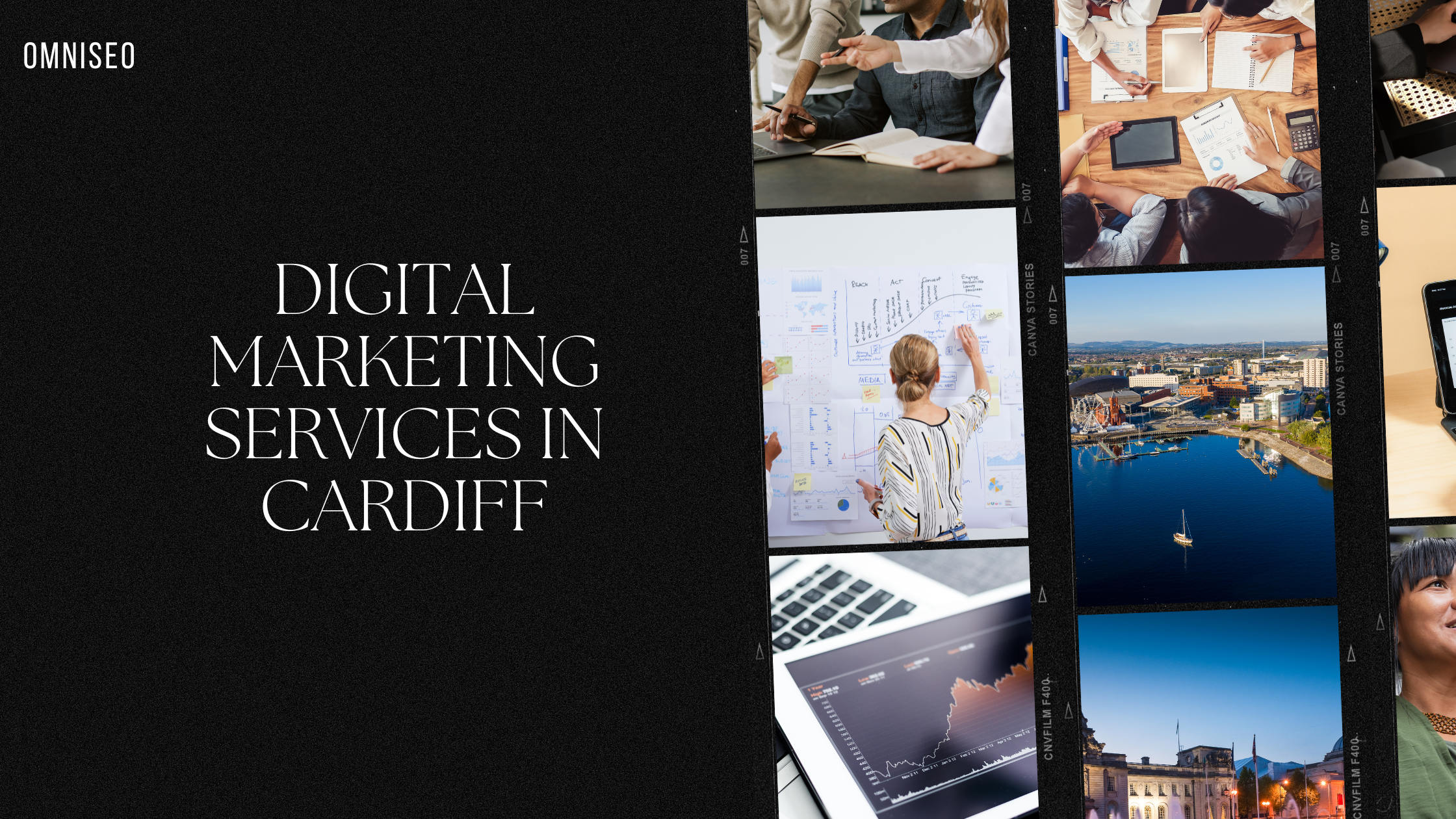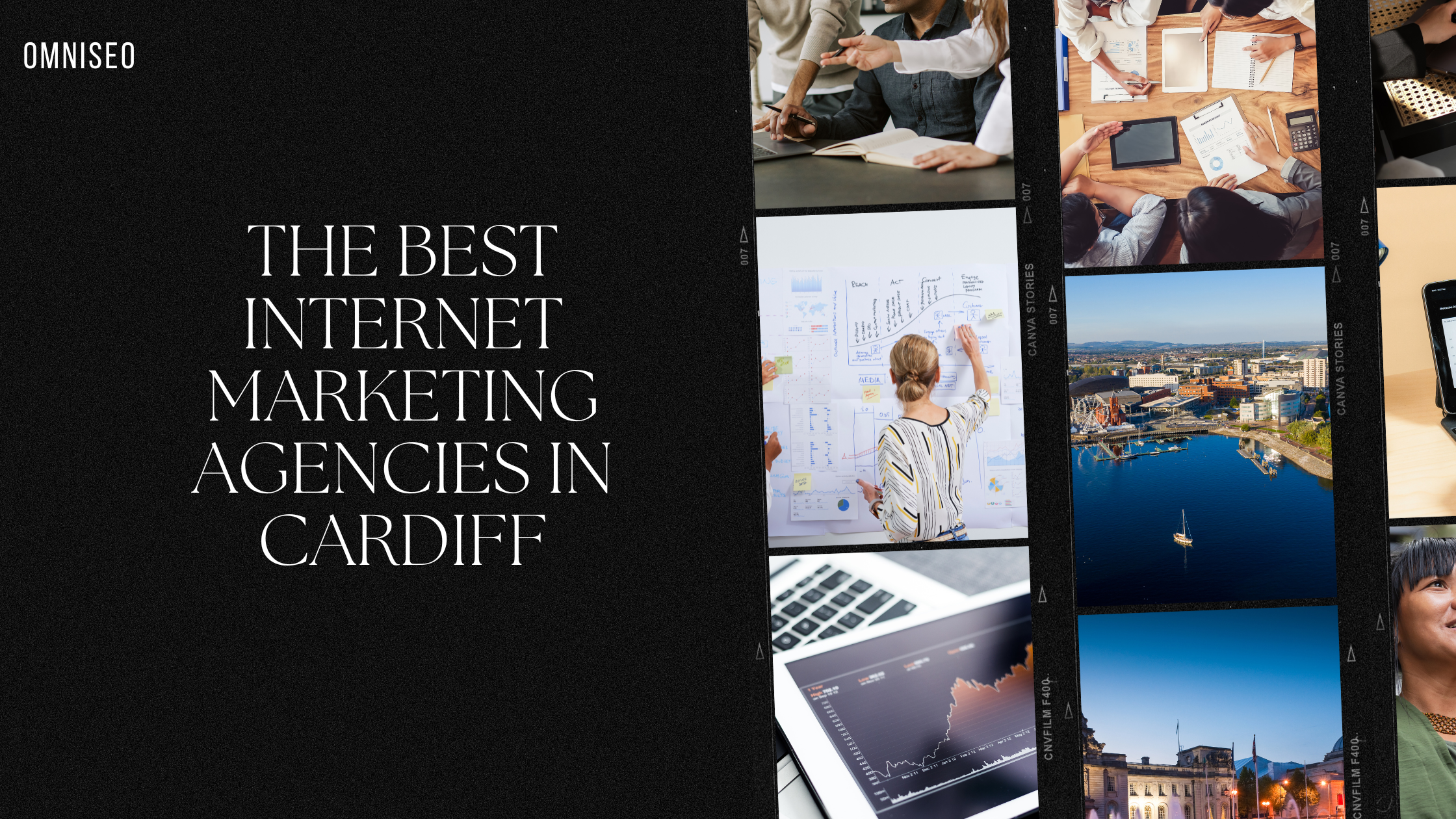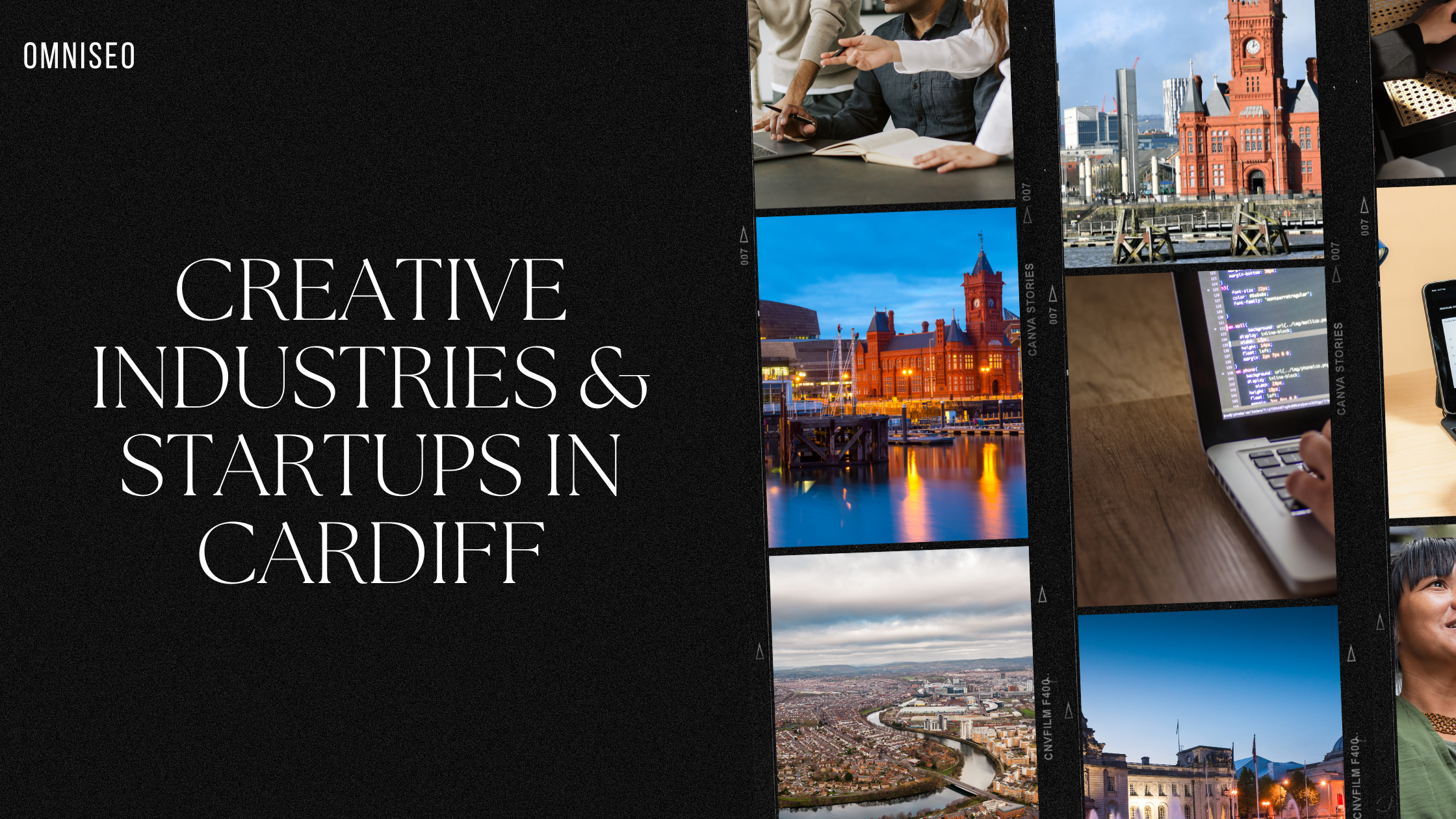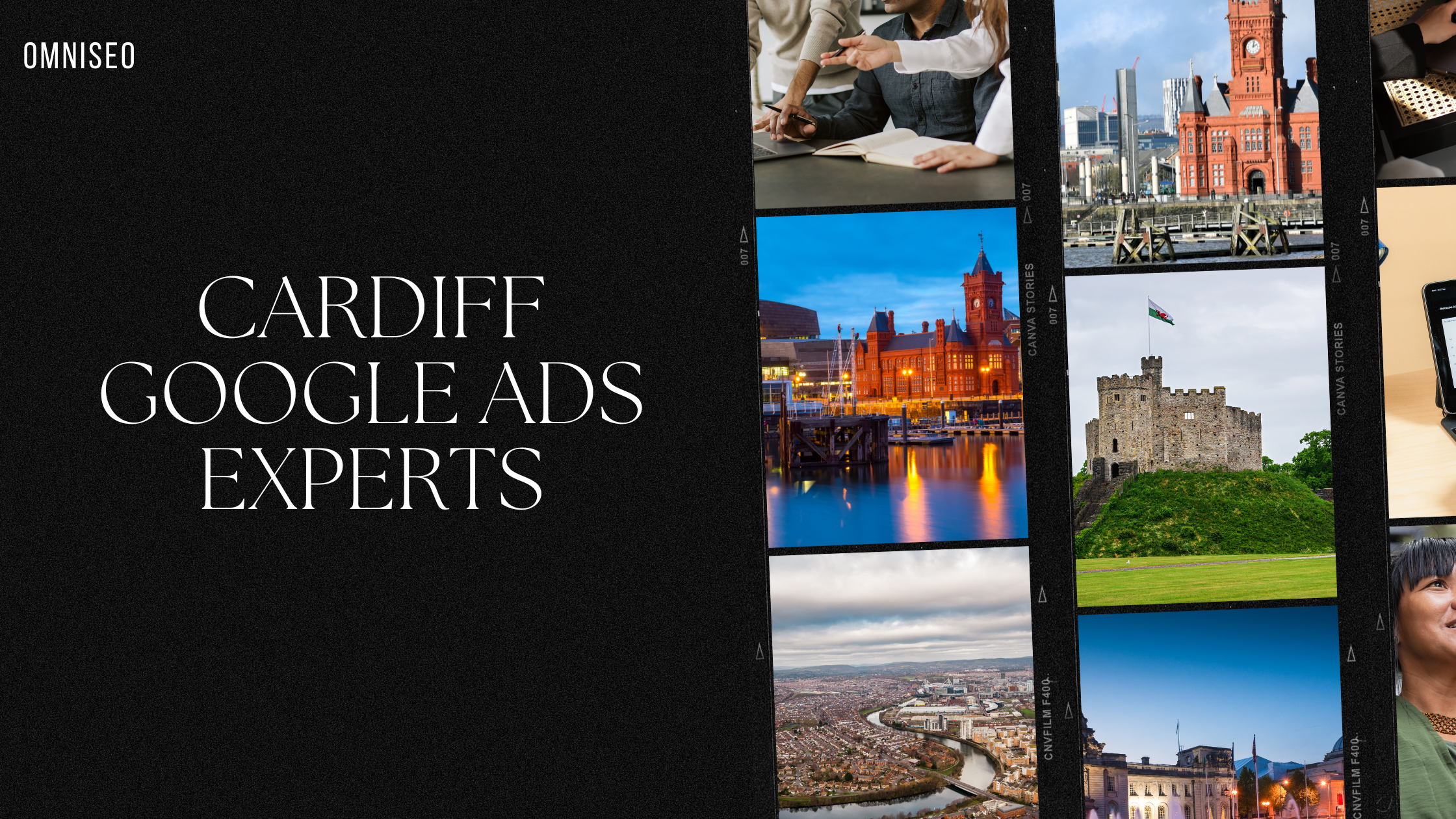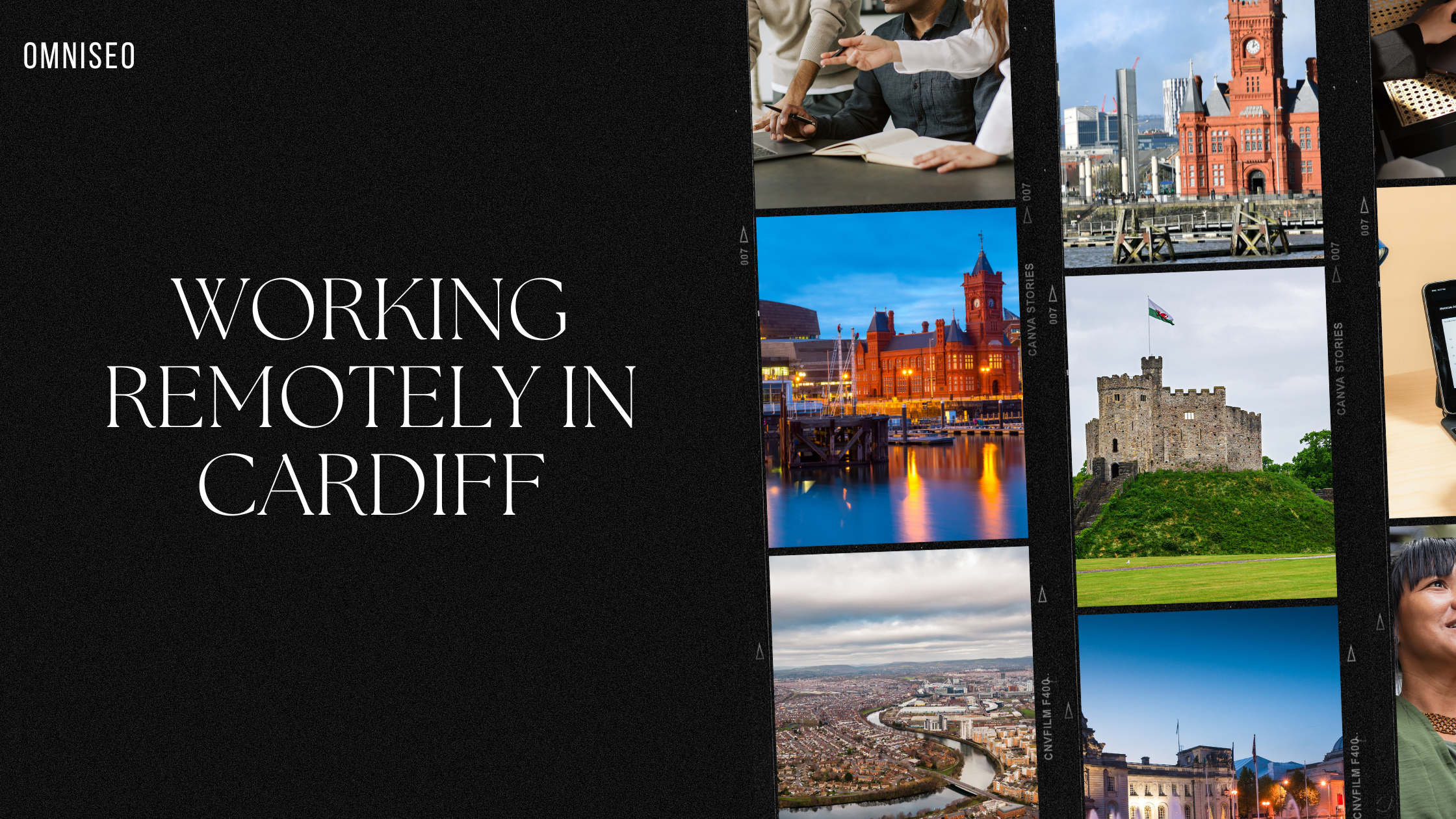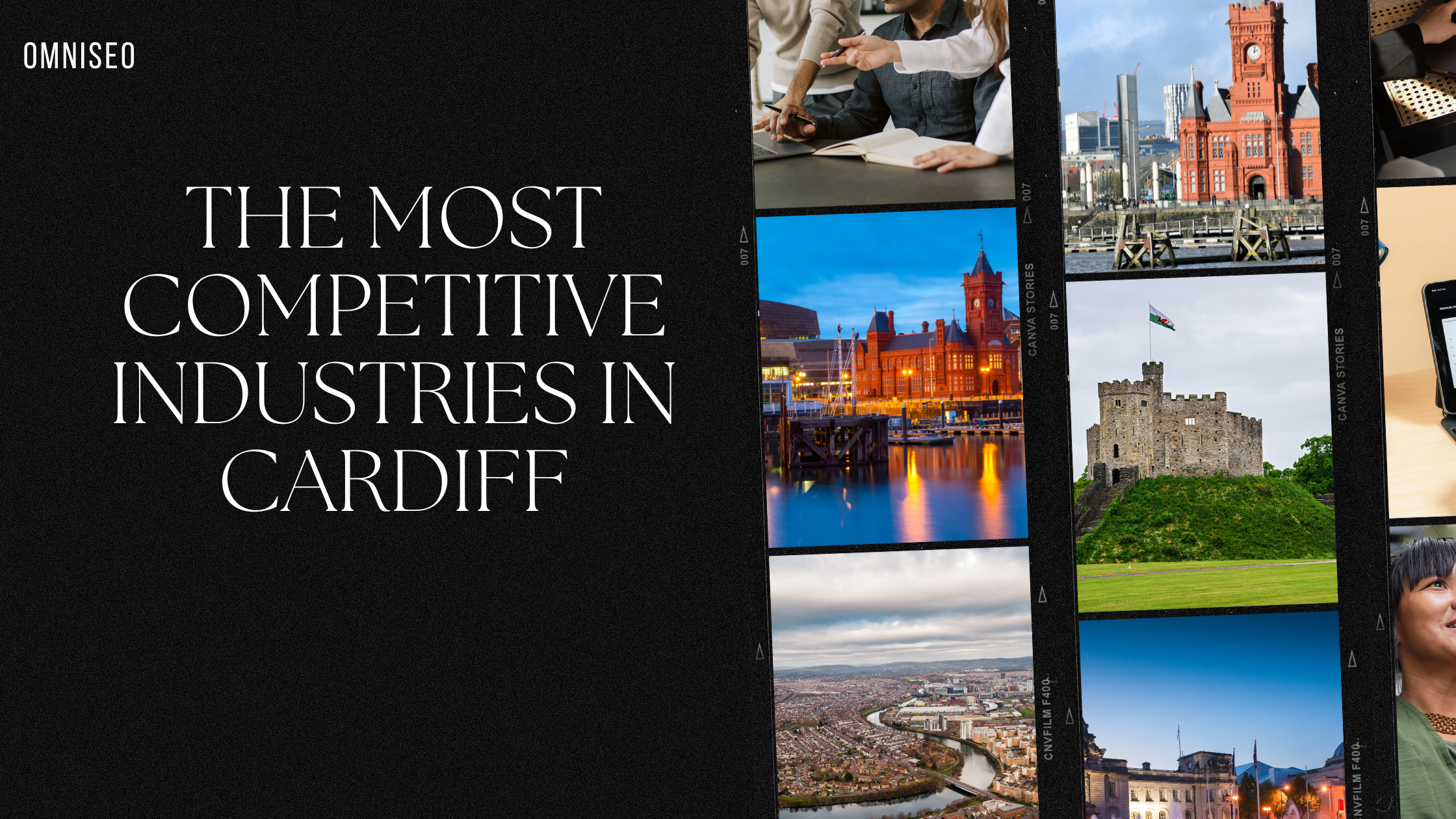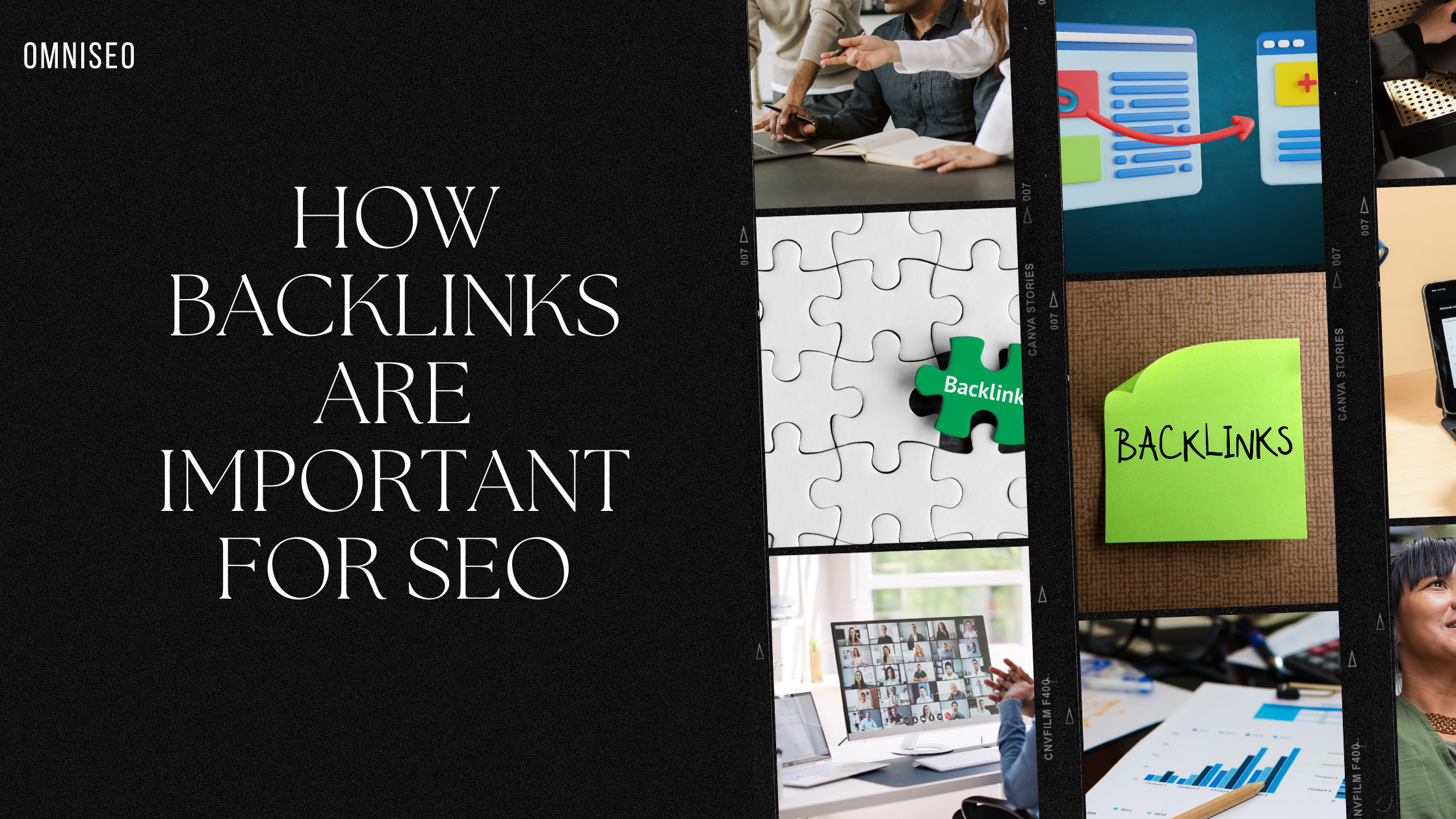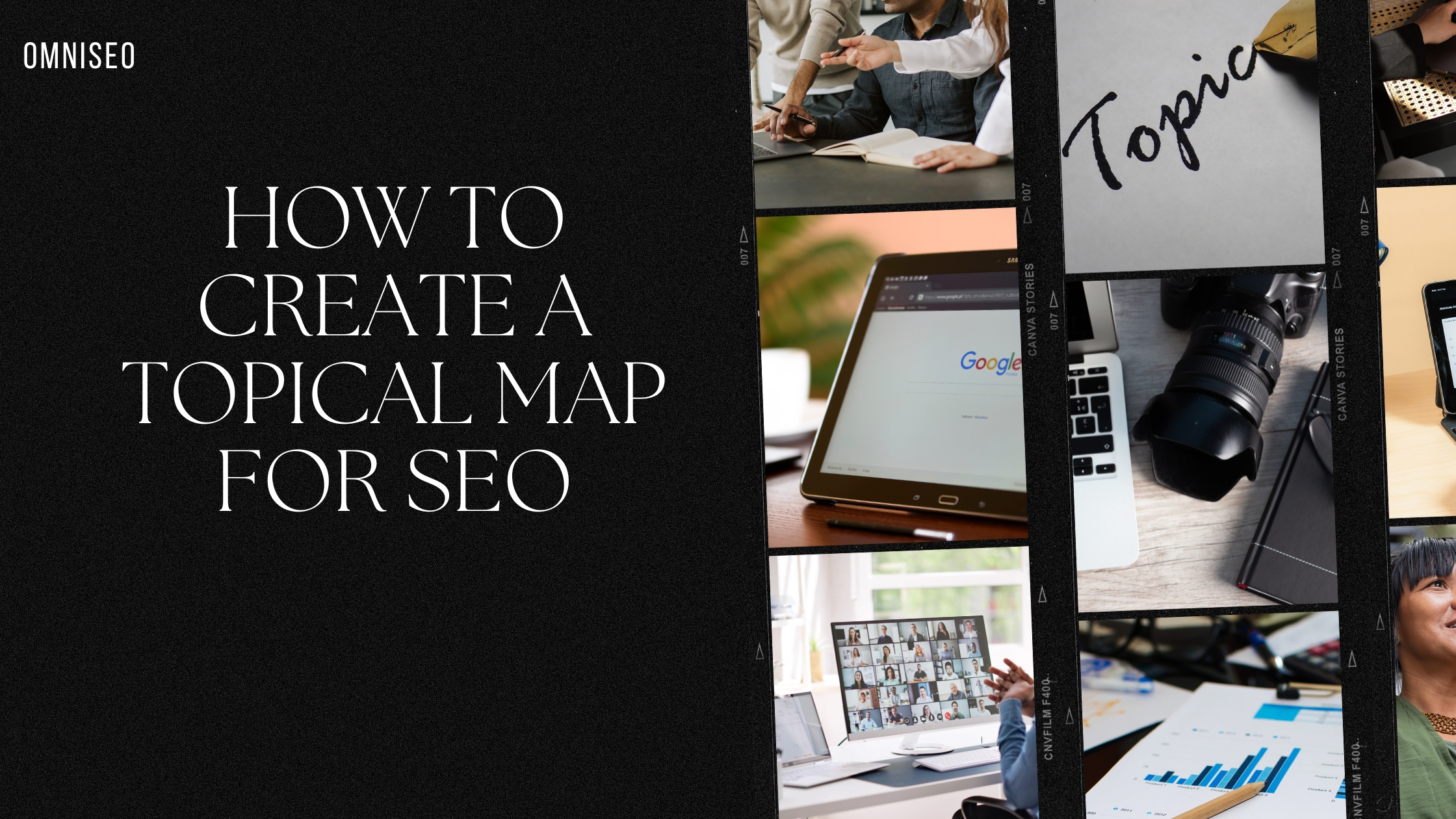The Role of Content Marketing in Cardiff’s SEO Landscape
The Role of Content Marketing in Cardiff’s SEO Landscape
Cardiff’s digital scene is buzzing, and like elsewhere, businesses are in a rush to grab attention online. From tech startups in Cardiff Bay to cosy cafés in Pontcanna, standing out in search results is a must for businesses across South Wales.
Content marketing is one of the most reliable weapons for boosting SEO, helping businesses climb Google rankings while winning over local customers.
Today we're having a quick look at why content marketing is a game-changer for Cardiff’s SEO landscape, how to craft content that clicks with the city’s vibrant market, and practical ways to make it part of your SEO strategy. By nailing local relevance and search intent, businesses can drive traffic, build trust, and cement their place in Cardiff's business environment.
But if this is all new to you, you might be a little confused at why this is so important.
Let's start at the beginning:
Why Content Marketing Matters for SEO in Cardiff

Content marketing is about creating valuable, relevant material—blog posts, videos, guides—that draws in and engages an audience. For SEO, it’s a cornerstone because search engines like Google favour websites with fresh, high-quality content. Content marketing offers a way to reach local customers and shine in a packed digital space.
Google’s algorithms reward content that answers user queries, matches search intent, and delivers a solid user experience. For example, if you run a Cardiff bakery business, posting a blog titled “Best Vegan Cakes in Cardiff” could potentially rank your site for local searches related to that question, reliably pulling in nearby customers. Content on local topics, when done right, also attracts backlinks from local sites, like WalesOnline or community blogs, which lift your own website’s authority for Cardiff related searches. Plus, engaging content keeps visitors on your site longer, signalling to Google that your pages deserve a high rank.
In the local business market, content marketing bridges global SEO tactics with local needs. The city’s residents, like most tightknit communities, look for authenticity and community. This means that content reflecting the cities culture can foster trust and loyalty. By mixing local charm with SEO best practices, businesses can capture both search engine and customer attention, making the most out of their local area as a sub-niche all of it's own.
Crafting Cardiff-Focused Content for SEO

Creating content that ranks well and resonates with Cardiff audiences demands a clear strategy. Here are the key elements to focus on:
1. Target Local Keywords

Keyword research is, like with most SEO related tasks, where it starts. Use tools like Google Keyword Planner, ahrefs or SEMrush to pinpoint terms local residents search for, especially terms that are looking specifically for businesses in the area, like “Cardiff web design” or “best restaurants in Cardiff.” Long-tail keywords, such as “affordable family activities in Cardiff,” often face less competition and convert better.
Weaving these keywords naturally into titles, headings, and body text is a good way to ensure your content indexes well in search engines. Overloading with keywords looks spammy and hurts rankings, so keep it balanced and relevant. A gym in the area could easily slip “Cardiff fitness classes” into a blog about workout trends, ensuring the term fits smoothly and without being forced.
2. Create Locally Relevant Content

Cardiff’s identity—its history, neighbourhoods, and events—is a goldmine for content. Blog posts like “What’s On in Cardiff This Weekend” or “A Guide to Cardiff’s Independent Shops” tap into local pride and draw readers. For instance, a retailer could publish a piece on “Shopping in St David’s vs. Mermaid Quay,” comparing two hotspots in a way that is helpful to local shoppers while also subtly showcasing their own products.
Event-based content is another winner. Writing about Cardiff’s Food and Drink Festival or Winter Wonderland pulls in timely traffic in large numbers, including from visitors from other cities. Include practical details, like dates and locations, to meet searchers’ needs. Adding photos of Cardiff landmarks or local events makes content visually engaging and shareable on social media, boosting its reach.
3. Match Search Intent

Content must deliver what users want. Google sorts search intent into different categories. For example keywords can be informational, meaning they're looking to learn specific information (“history of Cardiff Castle”), navigational, meaning they're trying to navigate to a specific website or page (“Cardiff Council waste collections”), and transactional, meaning they're looking to make a purchase (e.g., “buy concert tickets Cardiff”). An event planner might create a blog for informational intent, like “How to Plan a Wedding in Cardiff,” while a retailer could target transactional intent with “Where to Buy Artisan Gifts in Cardiff.”
To hit the mark on search intent, check the top-ranking pages for your target keywords, since you may fail to achieve anything if your content is not what Google is looking to rank for that particular term. If someone searches “Cardiff yoga studios,” they likely want a list of options with details like class schedules and prices. A yoga studio’s blog could provide exactly that, formatted with clear headings and a map of Cardiff locations. However, trying to rank a page only talking about your own studio may fail even with an excessive amount of links, since that goes against the intent of the search term.
4. Optimise for Engagement

Engaging content keeps users on your site, cutting bounce rates and boosting SEO. Best practice is to use a friendly, natural but knowledgeable tone that feels like a chat with a local. Break up text with bullet points, images, and subheadings where relevant for easy reading. For example, an estate agent could write a guide on “Buying a Home in Cardiff” with separate sections on specific areas, complete with photos and price ranges.
It's also good practice to try to spark interaction by ending posts with a call to action, like “Comment with your favourite Cardiff coffee shop!” or “Share this guide with a friend.” This lifts engagement metrics, which are weighed by Google when it is ranking pages.
Integrating Content Marketing into Your Cardiff SEO Strategy
Content marketing needs to slot into a wider SEO plan to shine. Here’s how Cardiff businesses can make it work:
1. Build a Content Calendar

Plan content around Cardiff’s seasonal trends. A post about “Cardiff Christmas Markets” in November or “Summer Activities in Bute Park” in July aligns with local searches and maximises your chances of getting decent traffic. Use a content calendar to schedule posts consistently—weekly blogs or monthly guides keep your site active, which Google loves.
2. Leverage Local Backlinks

Share your content with Cardiff-based groups, like local charities or business networks, to earn backlinks. A post about “Cardiff’s Best Charity Events” could be shared with local nonprofits, who might link back to your site. These backlinks signal authority to Google, lifting your rankings.
3. Promote on Social Media

Cardiff locals are active on platforms like Instagram and Facebook. Share your content there with relevant local hashtags like #CardiffLife or #CardiffEvents. A florist could post a blog link about “Wedding Flowers in Cardiff” on Instagram, tagging venues like Cardiff Castle to reach engaged couples.
4. Track and Refine
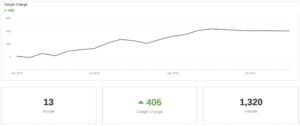
Use Google Analytics and Search Console to track how your content performs. Check which posts drive traffic and which keywords rank highest. If a post about “Cardiff coworking spaces” gets lots of clicks, create related content like “Best Cafés for Remote Work in Cardiff.” If a post of yours has ranked well but not as high as you'd like, consider buying some backlinks from a Cardiff SEO agency. This data-driven approach keeps your content relevant.
Examples of how to Use Content Marketing in Cardiff
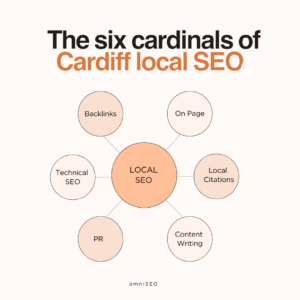
Cardiff businesses are already using content marketing to boost SEO, but there are always new ideas worth trying. Imagine a Canton restaurant posting a blog on “Cardiff’s Hidden Food Gems,” mentioning nearby spots while also linking to their menu. Sneaky and effective! This pulls in foodies searching for dining options and earns shares from local food bloggers.
This type of strategies shows how content can be practical, helpful, and still promotional. By focusing on what Cardiff residents care about—community, culture, and convenience—businesses create content that ranks well and builds lasting connections.
Challenges and Solutions
Content marketing has its challenges. Time constraints and lack of expertise can slow progress. Hiring a Cardiff-based SEO agency, like OmniSEO, can bridge the gap. These guys know the local market, do this full time and can craft content that hits home. For those on a tight budget, free tools like AnswerThePublic can also spark ideas for blog topics based on Cardiff-related searches.
Staying consistent is another hurdle. Irregular posting can dent SEO, so stick to a manageable schedule, like one blog post a month, one per week if possible, etc. Quality beats quantity—Google prefers one well-researched post over several rushed ones.
As we've hopefully illustrated, content marketing is a powerful tool for Cardiff businesses aiming to climb Google’s rankings and connect with locals. By targeting local keywords, creating relevant content, and matching search intent, businesses can drive traffic and build trust. Weaving content into a broader SEO strategy—through calendars, backlinks, and social promotion—maximises impact. In a city as lively as ours, content that captures its spirit while solving real problems is the key to SEO success.
Start small, stay consistent, and watch your online presence soar.
Want help with this? We offer free game plans for local businesses. Just click through to this form to get yours and start growing your Cardiff business online, or use our contact page if you have any questions.
Good luck!
Digital Marketing Services in Cardiff
Digital Marketing Services in Cardiff: A Useful Guide for New Businesses
Cardiff, the vibrant capital of Wales, pulses with economic energy. From financial powerhouses to creative startups, the city’s business scene is as diverse as its population.
In this competitive environment, standing out online is critical. Digital marketing offers Cardiff businesses a way to connect with customers, build brand loyalty, and drive growth. Today we're exploring some of the options for digital marketing services available in Cardiff, why they’re essential, and how local agencies can help businesses thrive.
The Importance of Digital Marketing in Cardiff
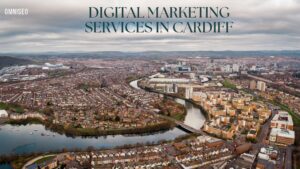
Cardiff’s economy thrives on variety. Finance, technology, hospitality, and retail sectors coexist, each vying for attention in a city that’s both a commercial hub and a cultural hotspot. With a large student population and a growing professional base, Cardiff’s residents are digitally engaged. Most UK adults check the internet daily, often turning to Google or social media before making purchases. For businesses, this creates a clear opportunity: a strong online presence can capture attention and convert interest into sales.
Digital marketing encompasses strategies like search engine optimisation, social media campaigns, and paid advertising. Unlike billboards or print ads, these methods allow businesses to target specific audiences, track results in real time, and adjust campaigns for better performance. For a Cardiff café hoping to attract locals or a tech firm targeting global clients, digital marketing provides a cost-effective way to compete. The city’s agencies understand this dynamic, offering tailored services that reflect Cardiff’s unique market.
Search Engine Optimisation: Climbing the Google Ladder
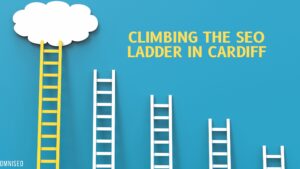
One of the most impactful digital marketing services is search engine optimisation, or SEO. This process involves tweaking your website to rank higher on Google for relevant searches. Imagine a Cardiff resident searching for “best coffee shop near me.” A well-optimised site ensures your business appears near the top, not buried on page five. Cardiff SEO agencies excel at this, researching keywords like “Cardiff bakery” or “accountants in Cardiff” to align with what customers are typing.
SEO isn’t just about keywords, though. It involves refining website content, improving page load speeds, and earning links from trusted sites to boost credibility. Local SEO is particularly valuable in Cardiff, where agencies optimise for Google’s map results, helping businesses appear when someone searches for nearby services. Agencies like OmniSEO have built reputations for getting clients to the top of search results, driving organic traffic without the need for paid ads.
Pay-Per-Click Advertising: Fast Results, Precise Targeting

For businesses seeking quicker wins, pay-per-click advertising, or PPC, is a go-to strategy. With PPC, you run ads on platforms like Google or Bing, paying only when someone clicks. Cardiff agencies craft campaigns that zero in on specific audiences, such as locals searching for gym memberships or professionals looking for accounting services. They write compelling ad copy, choose the right keywords, and monitor performance to ensure every pound spent delivers value.
What makes PPC so effective is its speed. While SEO builds momentum over months, PPC can drive traffic within hours, making it ideal for product launches or seasonal promotions. To learn more about PPC results, take a look at one of our Case Studies. The ability to target by location, interests, or even search history ensures ads reach the people most likely to buy.
Social Media Marketing: Engaging Cardiff’s Diverse Audience

Social media is a cornerstone of digital marketing, especially in a city as connected as Cardiff. Platforms like Facebook, Instagram, and LinkedIn let businesses engage directly with customers, from students in Cathays to executives in Cardiff Bay. Agencies create eye-catching posts, run targeted ads, and manage comments to build a loyal following. A Cardiff restaurant, for example, might share Instagram Reels of its dishes, using local hashtags like #CardiffEats to attract diners.
The strength of social media lies in its versatility. A retail brand can run Facebook ads for a sale, while a B2B firm might share LinkedIn articles to establish authority. Cardiff agencies like WCS and Caffeine Marketing understand how to tailor content to each platform, ensuring posts resonate with the city’s diverse demographics. Their campaigns don’t just boost likes—they drive real engagement, turning followers into customers.
Content Marketing: Building Trust Through Storytelling
Content marketing is about creating material that informs, entertains, or inspires. Think blog posts that answer customer questions, videos that showcase your business, or email newsletters that keep your brand top-of-mind. In Cardiff, where competition is fierce, quality content sets you apart. A well-written blog about “Top 5 Things to Do in Cardiff” can draw visitors to a tour company’s site, while a slick video can highlight a retailer’s new collection.
Cardiff agencies specialise in this area, producing everything from articles to short-form videos for TikTok. Their work builds trust, positioning businesses as experts in their field. Content also supports other strategies, like SEO, by incorporating keywords that improve search rankings. For businesses, this means more visibility and stronger connections with customers.
Web Design: The Foundation of Your Online Presence
A great website is the backbone of any digital marketing strategy. If your site is slow, confusing, or outdated, visitors will leave before exploring your offerings. Cardiff agencies focus on creating websites that are fast, mobile-friendly, and designed to convert. They balance aesthetics with functionality, ensuring your site reflects your brand while guiding users toward actions like buying or booking.
Beyond design, agencies optimise for conversions, tweaking layouts to encourage sign-ups or purchases. Infinity Digital and Spindogs are Cardiff leaders in this space, building sites that perform as well as they look. For businesses, a professional website isn’t just a digital storefront—it’s a tool that supports SEO, PPC, and content efforts, tying all marketing channels together.
Navigating Cardiff’s Agency Scene
Cardiff is home to a range of digital marketing agencies, each bringing something unique to the table. OmniSEO one of Wales’ most highly regarded, is a powerhouse in SEO and PPC, working with major nationwide businesses to dominate search rankings. Their data-driven approach suits businesses with ambitious growth plans. Caffeine Marketing, based at Capital Tower, has been a trusted name since 2011, offering affordable services across SEO, PPC, and social media. Clients value their transparency and focus on results.
Thrive Internet Marketing Agency takes a personalised approach, blending SEO, social media, and web development for businesses in competitive sectors like finance. Lunax Digital, located in Caerphilly Business Park, is a favourite for purpose-led brands, delivering impressive lead generation and creative websites. Spindogs stands out for its audience targeting, testing ad variations to optimise performance, while Burning Red excels in content, particularly video and B2B campaigns for clients like Cardiff University.
Finding the Right Fit for Your Business
Choosing an agency depends on your goals and resources. Small businesses might lean toward Caffeine Marketing or Lunax Digital, which offer high-impact services without breaking the bank. B2B firms benefit from Burning Red’s LinkedIn expertise or Spindogs’ targeted campaigns. Retail and hospitality brands often turn to Thrive or Infinity Digital for social media and PPC that drive sales. Startups, meanwhile, appreciate Head45’s end-to-end solutions, from branding to app development.
When picking an agency, look at their track record. Case studies show whether they’ve delivered for businesses like yours. Clear pricing is crucial to avoid surprises, and local knowledge is a plus—Cardiff agencies should understand the city’s market, from its student-heavy neighbourhoods to its corporate hubs. Good communication is non-negotiable; the best agencies are responsive and collaborative, acting as partners rather than vendors.
Platform Strategies for Cardiff Businesses
Different platforms serve different purposes. Google is king for capturing local searches, with agencies like Peak Online optimising for terms like “Cardiff plumber” or map results. Facebook ads work well for events or promotions, targeting Cardiff residents with precision. Instagram thrives on visuals, perfect for sharing photos or Reels with hashtags like #CardiffLife. LinkedIn is ideal for B2B, where thought leadership content can reach decision-makers in Cardiff’s financial sector. TikTok, meanwhile, lets brands tap into younger audiences with fun, trending videos.
Budgeting for Digital Marketing
Costs in Cardiff vary by service. SEO campaigns typically range from £500 to £2,000 per month, depending on whether you’re targeting local or national audiences. PPC can cost £300 to £1,500 monthly, plus ad spend. Social media management runs £400 to £2,000, while a custom website might set you back £1,000 to £5,000. Content like blogs or videos ranges from £200 to £1,000 per piece. Agencies like LS Digital work within tight budgets, and many, like Digital Marketing Wales, offer free consultations to map out costs.
Making Digital Marketing Work in Cardiff
To succeed, businesses should tie campaigns to local events, like the Cardiff Food Festival or rugby matches, to boost relevance. Engaging with customers through comments or local hashtags builds community. Testing small campaigns before scaling up helps refine what works. Combining channels—SEO with social media, for example—creates a cohesive strategy, as agencies like Liberty Marketing demonstrate. Tracking results with tools like Google Analytics ensures you’re getting value from every effort.
Wrapping Up
Digital marketing is a game-changer for Cardiff businesses, offering tools to reach customers and grow in a competitive market. From SEO and PPC to social media, content, and web design, agencies like Liberty Marketing, Caffeine Marketing, Thrive, Lunax Digital, Spindogs, and Burning Red provide solutions tailored to every need. By partnering with the right agency and focusing on platforms that suit your audience, you can elevate your online presence and achieve lasting success. Contact a Cardiff agency for a free consultation and take the first step toward digital growth today.
The Best Full-Service Internet Marketing Agency in Cardiff
The Best Full-Service Internet Marketing Agency in Cardiff
Cardiff, the bustling capital of Wales, is a hotspot for businesses looking to make their mark online. With a thriving economy and a growing digital scene, the demand for top-notch internet marketing agencies has never been higher.
A full-service internet marketing agency can be a game-changer, offering everything from search engine optimisation (SEO) to web design, paid ads, and social media management under one roof.
But with so many options in Cardiff, how do you pick the best?
Today we're going to dive straight into the clear pick for the top full-service internet marketing agency in Cardiff, and highlight a few other strong contenders, while also breaking down what to look for and what these agencies can do for your business.
If you're looking to hire a digital marketing agency or SEO agency in Cardiff for the first time, you couldn't have landed un a better place.
Let's start with the basics:
What to Look for in a Digital Marketing Agency

Choosing the right agency is about finding a partner that aligns with your goals. Here are key factors to consider:
-
Range of Services: A true full-service agency should cover SEO, pay-per-click (PPC) ads, social media, content creation, web design, and analytics. This ensures all your marketing needs are handled cohesively.
- Expertise in the Right Place: While the above is a crucial point for those looking for an agency that can manage ongoing, full spectrum growth for them, this doesn't apply to everyone. If you are looking to prioritise one specific area over others, consider sticking to an agency that has exceptional proven results in that area.
-
Proven Results: Look for case studies, client testimonials, or data showing tangible outcomes like increased traffic, higher rankings, or boosted sales.
-
Transparency: The best agencies are open about their methods, whether it’s sharing backlink details for SEO or providing real-time campaign reports.
-
Industry Experience: An agency that understands your sector—be it eCommerce, hospitality, or finance—can tailor strategies to your audience.
-
Client-Centric Approach: Flexibility, clear communication, and a willingness to customise plans (without locking you into long contracts) are signs of a good fit.
-
Local Expertise: For Cardiff businesses, an agency with local ties can leverage regional connections for better SEO.
-
Budget Fit: Pricing should match the value offered. Some agencies offer tiered packages, while others provide bespoke quotes. Ensure the cost aligns with your budget and expected ROI.
What the Best Full-Service Agencies Do for You
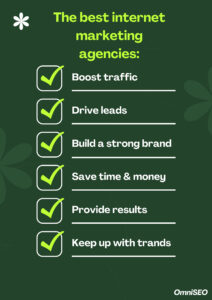
A great full-service agency doesn’t just execute tasks—it drives growth. Here’s what the best ones deliver:
-
Boost Online Visibility: Through SEO and PPC, they get your website ranking higher on Google and appearing in targeted ads, putting you in front of the right audience.
-
Drive Traffic and Leads: From social media campaigns to content marketing, they attract visitors and convert them into leads or customers.
-
Build a Strong Brand: With professional web design and consistent messaging, they create a polished online presence that builds trust.
-
Save Time and Resources: By handling all aspects of marketing, they free you up to focus on running your business.
-
Provide Measurable Results: Top agencies use tools like Google Analytics or custom dashboards to show exactly how campaigns are performing, from clicks to conversions.
-
Stay Ahead of Trends: They keep up with algorithm changes, new platforms, and emerging strategies to keep your marketing sharp.
The Best Full-Service Internet Marketing Agency in Cardiff: OmniSEO
When it comes to full-service internet marketing in Cardiff, OmniSEO clearly stands out as the top choice. Founded in 2017, this Cardiff-based agency has built a stellar reputation for delivering results, particularly in SEO, while offering a complete suite of digital marketing services. Here’s why OmniSEO earns the number one spot:
Why OmniSEO is the Best
-
Unmatched SEO Expertise
OmniSEO started as an SEO specialist, giving it a deep understanding of search engine mechanics that sets it apart. While it now offers full-service marketing, its SEO prowess remains unmatched, especially for eCommerce and local businesses. For example, the agency helped a client, Spheric, rank first on Google for their main keyword in just six months, driving over 3,000 monthly organic visitors in under a year. Their ethical, white-hat approach ensures long-term results without risking Google penalties. -
eCommerce Specialisation
OmniSEO has carved out a niche in eCommerce SEO, particularly for platforms like Shopify and Magento. They optimise product and category pages to boost rankings and sales, making them a go-to for online retailers. This focus is rare among Cardiff agencies, many of which offer broader but less specialised services. -
Transparency and Accountability
Transparency is a cornerstone of the agency's approach. Clients get access to a dedicated Monday.com board to track campaign progress and a live reporting dashboard (omniReports) for real-time data on rankings, traffic, and more. Unlike some agencies that hide their methods, Omni shares backlink details via a “Link Tracking Sheet” and even offers a ranking guarantee—if they don’t secure agreed-upon backlinks, you get a refund. This level of openness is unmatched in Cardiff’s marketing scene. -
Comprehensive Services
Beyond standard organic SEO, the agency also delivers PPC campaigns to lower ad costs and improve ROI, user-friendly web design to enhance conversions, and integrated digital marketing to tie it all together. Whether you’re a local Cardiff shop or an international eCommerce brand, they tailor strategies to your needs. -
Client-Centric Flexibility
OmniSEO avoids rigid, standardised contracts, offering bespoke packages that fit your budget and goals. Their team works closely with clients, providing clear communication and measurable results. With over 100 businesses served since 2017, their track record speaks for itself. -
Local Advantage
Based in Cardiff, OmniSEO leverages local relationships to secure geo-relevant backlinks, giving Cardiff businesses an edge in local SEO. This hometown advantage, combined with their ability to serve national and global clients, makes them versatile and effective.
Other Top Full-Service Agencies in Cardiff
While OmniSEO takes the top spot, Cardiff has other excellent agencies worth considering. Here are three strong alternatives:
1. Caffeine Marketing
-
Overview: An award-winning agency with a UK-wide presence, Caffeine Marketing is known for tailored strategies and a broad service range, including SEO, PPC, social media, and web design. They rank highly for “SEO Cardiff” searches, reflecting their strong local presence.
-
Strengths: Caffeine excels at creating bespoke campaigns and has worked with high-profile clients like Cardiff University. Their focus on data-driven strategies ensures measurable outcomes.
-
Why Consider Them?: Ideal for businesses seeking a polished, big-agency feel with a proven track record. However, their broader focus may lack the eCommerce specialisation or heavy backlink focus of OmniSEO.
2. Thrive Internet Marketing Agency
-
Overview: Thrive is a full-service agency with a strong emphasis on SEO, local SEO, PPC, and content marketing. They’re backed by 5-star Clutch reviews and awards from UpCity.
-
Strengths: Thrive shines in local SEO and content-driven strategies, making them a great fit for Cardiff businesses targeting nearby customers. Their web design services are also top-notch.
-
Why Consider Them?: Perfect for small to medium-sized businesses needing a balanced marketing approach.
3. Pinnacle Internet Marketing
-
Overview: Established in 2006, Pinnacle offers SEO, PPC, email marketing, and social media management, with a focus on transparent monitoring via their Web Fingerprints tool.
-
Strengths: Pinnacle’s long history and transparent reporting make them a reliable choice. They cater to diverse industries, from finance to retail.
-
Why Consider Them?: Great for businesses wanting a seasoned agency with clear performance tracking. However, their generalist approach may not match Omni SEO’s eCommerce depth.
-
Client Highlight: Increased a Cardiff law firm’s organic traffic by 150% through SEO and content marketing.
How to Choose the Right SEO Agency for You
When selecting an SEO agency, focus on these key factors to ensure they meet your needs:
- Proven Expertise: Look for case studies showing results in your industry, such as eCommerce or local SEO, and confirm their technical SEO skills.
- Transparent Strategies: Seek clear, tailored plans with defined deliverables and realistic expectations, avoiding agencies promising instant results.
- Strong Communication: Ensure regular, detailed reports and a dedicated account manager for consistent updates and support.
- Ethical Practices: Prioritise agencies using white hat SEO, focusing on user experience and sustainable growth.
- Client Feedback: Check Google Reviews for insights into reliability and performance.
- Flexible Pricing: Compare quotes for transparent, value-driven packages that fit your budget.
- Goal Alignment: Choose an agency that understands your objectives and integrates with your broader marketing strategy.
Request a consultation, review case studies, and ask about their processes to find an agency that aligns with your goals and delivers measurable results.
Why Cardiff is a Hub for Digital Marketing
Cardiff’s vibrant economy, with SMEs employing nearly 63% of the workforce, fuels demand for digital marketing. The city’s cultural scene, business-friendly policies, and proximity to major UK markets make it a prime spot for agencies. Whether you’re a startup or an established brand, Cardiff’s agencies—like OmniSEO—have the tools and talent to help you compete online.
Final Thoughts
Finding the best full-service internet marketing agency in Cardiff comes down to results, transparency, and alignment with your goals. Omni SEO leads the pack with its SEO mastery, eCommerce focus, and client-first approach, making it the top choice for businesses aiming to grow online. Alternatives like Caffeine Marketing, Thrive Internet Marketing, and Pinnacle Internet Marketing are also excellent, each with unique strengths. By prioritising proven results, clear reporting, and a tailored strategy, you’ll find an agency that takes your business to new heights.
For a consultation with Omni SEO or to explore other options, visit their websites or reach out directly. Your next big win online is just a campaign away.
How Cardiff’s Small Businesses Can Compete with Big Brands in 2025
How Cardiff’s Small Businesses Can Compete with Big Brands in 2025
Cardiff, the vibrant capital of Wales, is a thriving hub for small and medium-sized enterprises (SMEs), with its dynamic economy spanning retail, hospitality, fintech, and creative industries. However, competing with big brands—those with deep pockets, established customer bases, and global reach—can feel daunting for any small business, with Cardiff's local businesses being no different.
In 2025, as digital transformation accelerates and consumer expectations evolve, local SMEs must leverage their unique strengths, adopt innovative strategies, and harness digital tools to level the playing field. In this post we will break down actionable ways Cardiff’s small businesses can compete with big brands, focusing on community engagement, digital marketing, cost-effective technologies, and local expertise.
The Challenges Cardiff SMEs Face
Before diving into solutions, it’s essential to understand the challenges small businesses in Cardiff face when competing with larger brands:
-
Limited Budgets: Big brands often have substantial marketing budgets for advertising, sponsorships, and product development, while SMEs operate on tighter margins.
-
Brand Recognition: Established brands benefit from widespread awareness, while local businesses must work harder to build trust and visibility.
-
Economies of Scale: Larger companies can offer lower prices due to bulk purchasing or streamlined operations, putting pressure on SMEs.
-
Digital Overwhelm: The complexity of digital marketing—SEO, social media, paid ads—can be intimidating for small teams with limited resources.
-
Talent Competition: Big brands can attract top talent, while SMEs may struggle to hire skilled professionals in a competitive market.
Despite these hurdles, Cardiff’s small businesses have unique advantages: agility, local knowledge, and the ability to forge authentic connections with customers. By focusing on these strengths, SMEs can carve out a competitive edge in 2025.
1. Leverage Local Identity and Community Engagement

One of the most powerful ways Cardiff SMEs can compete is by embracing their local identity. Cardiff’s residents take pride in supporting homegrown businesses, and the city’s cultural vibrancy—evident in events like the Cardiff Food Festival or rugby matches at Principality Stadium—creates opportunities for SMEs to connect authentically.
Strategies for Community Engagement:
-
Participate in Local Events: Set up stalls or sponsor events like Cardiff Bay’s Winter Festival or Pride Cymru to increase visibility. For example, a local café could offer free samples at a festival, building brand loyalty.
-
Collaborate with Other SMEs: Partner with complementary businesses, such as a Cardiff bakery teaming up with a local coffee roaster for a joint promotion. This amplifies reach and fosters community goodwill.
-
Support Local Causes: Align with charities or initiatives, like Cardiff Foodbank or environmental campaigns in Roath Park. Publicising these efforts on social media can enhance brand reputation.
-
Host Community Events: Organise workshops, pop-up shops, or networking events in spaces like Tramshed Tech to engage customers directly.
Why It Works:
Big brands often lack the local nuance to connect authentically with Cardiff’s residents. SMEs can capitalise on their understanding of neighbourhoods like Cathays (popular with students) or Pontcanna (known for artisanal shops) to create hyper-relevant campaigns. For instance, a boutique in Llandaff could host a “Shop Local” evening, attracting residents who value community over corporate chains.
2. Master Digital Marketing on a Budget

Digital marketing is a great equaliser, allowing small businesses to reach wide audiences without breaking the bank. In 2025, Cardiff SMEs can use cost-effective tools and strategies to compete with big brands’ marketing machines.
Key Digital Marketing Strategies:
-
Optimise for Local SEO: Ensure your business ranks high on Google for local searches like “coffee shop Cardiff” or “Cardiff web design.” Claim your Google My Business profile, add accurate details (address, hours), and encourage customer reviews. Agencies like Caffeine Marketing in Cardiff specialise in local SEO for SMEs.
-
Focus on Social Media Engagement: Platforms like Instagram and TikTok are ideal for showcasing personality. Create short, engaging videos—e.g., a behind-the-scenes look at a Cardiff boutique or a quick recipe from a local deli. Use hashtags like #CardiffBusiness or #ShopLocalCardiff to boost discoverability.
-
Run Targeted Paid Ads: Platforms like Facebook and Instagram allow precise targeting by location, age, and interests. A Cardiff gym could target fitness enthusiasts in Newport or Barry with a budget as low as £50 per month. Agencies like Ripple Marketing offer affordable ad management for SMEs.
-
Leverage User-Generated Content (UGC): Encourage customers to share photos or reviews of your products, then repost them. This builds trust and reduces content creation costs. For example, a Cardiff jewellery store could run a contest where customers share photos wearing their pieces.
-
Email Marketing: Use free or low-cost tools like Mailchimp to send personalised newsletters. A Cardiff bookstore could email monthly reading recommendations, driving repeat visits.
Why It Works:
Big brands often rely on broad, generic campaigns, while SMEs can create hyper-targeted content that resonates with Cardiff’s diverse demographics—students, professionals, families. Digital tools level the playing field, allowing small budgets to yield big results when used strategically.
3. Adopt Cost-Effective Technologies
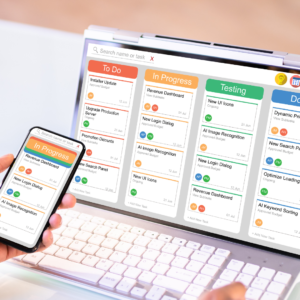
Technology empowers Cardiff SMEs to streamline operations, enhance customer experiences, and compete with big brands’ resources. In 2025, affordable tools are more accessible than ever.
Technologies to Embrace:
-
E-Commerce Platforms: Platforms like Shopify or WooCommerce allow SMEs to create professional online stores for under £50/month. A Cardiff gift shop could sell Welsh-themed products globally, competing with larger retailers.
-
Customer Relationship Management (CRM): Tools like HubSpot (free tier) or Zoho CRM help track customer interactions, enabling personalised marketing. A Cardiff fitness studio could use CRM to send tailored class reminders.
-
Automation Tools: Use Zapier or Hootsuite to automate repetitive tasks like social media posting or invoicing, freeing up time for strategic work.
-
AI-Powered Insights: Free AI tools like Google Analytics or paid options from Cardiff agencies like Thrive Internet Marketing Agency provide data on customer behavior, helping SMEs optimise campaigns.
-
Point-of-Sale (POS) Systems: Modern POS systems like Square offer inventory tracking and analytics, ideal for Cardiff’s retail and hospitality businesses.
Why It Works:
Big brands invest heavily in proprietary tech, but SMEs can access similar capabilities through affordable, off-the-shelf solutions. These tools enhance efficiency and customer satisfaction, allowing small businesses to punch above their weight.
4. Build a Strong, Authentic Brand Identity

A compelling brand identity helps Cardiff SMEs stand out in a crowded market. Unlike big brands, which can feel impersonal, small businesses can craft authentic narratives that resonate emotionally.
How to Build Your Brand:
-
Tell Your Story: Share your business’s origin, values, and connection to Cardiff. A family-run bakery could highlight its Welsh recipes or ties to Roath’s community.
-
Invest in Visuals: Use professional photography or affordable design tools like Canva to create cohesive visuals for social media, websites, and packaging.
-
Engage with Purpose: Align with values important to Cardiff residents, like sustainability or diversity. For example, a Cardiff clothing store could promote eco-friendly fabrics.
-
Consistency is Key: Ensure your logo, colors, and tone are consistent across all channels, from Instagram to in-store signage.
Why It Works:
Consumers in 2025 prioritise authenticity and purpose-driven brands. Cardiff SMEs can build loyalty by showcasing their human side, something big brands struggle to replicate.
5. Offer Exceptional Customer Experiences

Superior customer service is a powerful differentiator for Cardiff SMEs. While big brands rely on automated systems, small businesses can provide personalised, memorable experiences.
Ways to Enhance Customer Experience:
-
Personalised Service: Train staff to remember regular customers’ names or preferences. A Cardiff café could offer a free coffee to loyal patrons.
-
Quick Response Times: Reply promptly to social media messages or reviews. Tools like Hootsuite can streamline this process.
-
Loyalty Programs: Implement simple loyalty schemes, like a digital punch card via apps like Loyalzoo, to reward repeat customers.
-
Gather Feedback: Use surveys or Google Reviews to understand customer needs and improve offerings.
Why It Works:
Cardiff’s tight-knit community values personal connections. Exceptional service fosters word-of-mouth referrals, which are invaluable for competing with big brands.
6. Collaborate with Local Influencers and Networks

Influencer marketing and networking are cost-effective ways to amplify reach. Cardiff’s vibrant influencer scene and business networks offer opportunities for SMEs to gain exposure.
Collaboration Ideas:
-
Work with Micro-Influencers: Partner with Cardiff-based influencers (1,000–10,000 followers) who align with your brand. A local gym could gift a free session to a fitness blogger for a review.
-
Join Business Networks: Engage with organisations like Cardiff Business Club or Tramshed Tech to connect with other SMEs and potential customers.
-
Cross-Promote with Influencers: Offer exclusive discounts to an influencer’s followers, driving traffic to your business.
Why It Works:
Micro-influencers have highly engaged, local audiences, making them more effective than big-budget celebrity endorsements. Networking builds partnerships that enhance credibility.
7. Stay Agile and Adapt to Trends

Big brands are often slow to pivot due to bureaucracy, but Cardiff SMEs can adapt quickly to market shifts and consumer trends.
How to Stay Agile:
-
Monitor Trends: Follow platforms like X or industry blogs to spot trends like short-form video or AI-driven personalisation.
-
Experiment with New Platforms: Test emerging platforms like Threads or BeReal to reach niche audiences.
-
Iterate Based on Data: Use analytics from Google or social media to refine campaigns. For example, if Instagram Reels perform better than posts, shift focus to video.
Why It Works:
Agility allows SMEs to capitalise on trends before big brands, gaining a first-mover advantage in Cardiff’s market.
Cardiff’s small businesses may lack the resources of big brands, but they possess agility, local insight, and authenticity that can drive competitive success in 2025. By leveraging community engagement, mastering digital marketing, adopting cost-effective technologies, building strong brands, offering exceptional service, collaborating with influencers, and staying agile, SMEs can thrive in Cardiff’s vibrant economy. Agencies like Thrive Internet Marketing Agency, Caffeine Marketing, and Ripple Marketing offer tailored support to amplify these efforts, ensuring small businesses can compete and win. Start implementing these strategies today to transform your Cardiff SME into a local powerhouse, capable of standing toe-to-toe with the biggest brands.
For personalised advice or to connect with Cardiff’s top digital marketing experts, platforms like Bark.com can help you find the right partners to grow your business.
How Creative Industries and Entrepreneurship Combine in Cardiff Startups
How Creative Industries and Entrepreneurship Combine in Cardiff Startups
Cardiff, as the vibrant capital of Wales, has emerged as a dynamic hub for startups, particularly those at the intersection of creative industries and entrepreneurship. The city’s unique blend of cultural heritage, academic excellence, and supportive business ecosystem has fostered a thriving environment for innovative ventures.
As a leading Cardiff SEO agency, our success has always depended on the quality of the businesses around us.
Today we’re going to explore how Cardiff’s creative sectors—spanning media, film, television, design, arts, and digital innovation—are fuelling startup growth, driving economic impact, and positioning the city as a competitive player in the UK’s creative economy.
Let’s start at the beginning:
Cardiff’s Creative Economy

Cardiff’s creative industries are a cornerstone of its economic and cultural identity. The sector employs over 15,000 people in the city and benefits from nearly 500,000 square feet of incubation space, making it one of the largest and most successful creative hubs outside London. Major broadcasters like BBC Cymru Wales, ITV, and S4C anchor the city’s media landscape, while facilities such as Roath Lock Studios (the UK’s largest drama studios), GloWorks, and Pinewood Studios’ Cardiff facility provide world-class infrastructure for film and television production. These assets attract both established companies and startups, creating a fertile ground for entrepreneurial ventures.
The Creative Cardiff network, established in 2015 by Cardiff University’s Centre for the Creative Economy, plays a pivotal role in connecting creatives and entrepreneurs. With over 655 organisations and 2,424 individuals, the network fosters collaboration, shares resources, and promotes job opportunities. Its 2016 study revealed that creative businesses are concentrated in five key wards around Cardiff’s city centre and Cardiff Bay, highlighting the geographic clustering that drives innovation. This concentration facilitates knowledge exchange and partnerships, essential for startups navigating the competitive creative landscape.
Cardiff’s creative economy is further bolstered by its academic institutions. Cardiff University, Cardiff Metropolitan University, and the University of South Wales produce a steady stream of talent, with over 7,000 students studying creative disciplines. These institutions collaborate with industry through research and innovation programs, equipping graduates with the skills to launch or join startups. For instance, Cardiff University’s involvement in Media Cymru (2022–2026) supports the development of the screen sector, driving technological advancements that benefit local ventures.
The Entrepreneurial Ecosystem in Cardiff
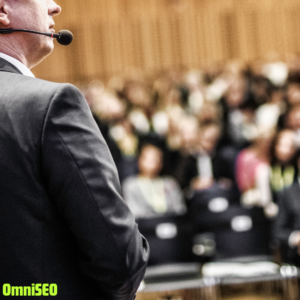
Cardiff’s startup scene has seen remarkable growth, with a 64% increase in startup activity between 2007 and 2017, far surpassing the Welsh average of 22%. In 2014 alone, 6,327 businesses were registered in the city, earning Cardiff a spot among the UK’s top 20 entrepreneurial hotspots. The city’s affordability, with average house prices in 2016 at £191,582 (compared to £231,103 in Edinburgh), makes it an attractive base for founders. Additionally, 43.5% of Cardiff’s working-age population holds NVQ Level 4 qualifications or above, providing a highly skilled workforce for startups.
Government support has been instrumental in this growth. The Welsh Government’s Development Bank of Wales offers loans and equity packages from £50,000 to £2 million, while the Wales Business Fund and Wales Technology Seed Fund target tech-focused startups. The £1.28 billion Cardiff Capital Region City Deal, agreed in 2016, invests in infrastructure, connectivity, and business governance, projecting a 5% increase in regional gross value added (GVA). Organisations like Cardiff Start, Wales’s largest startup community, empower entrepreneurs through events, mentorship, and resources, while accelerators like NatWest Entrepreneur Accelerator and Barclays Eagle Lab provide fully funded programs to scale businesses.
Collaborative workspaces, such as Meanwhile House Cardiff, Tramshed Tech, and Rabble Studio, support over 247 businesses and 550 individuals across Wales. These spaces offer affordable, flexible environments where creative and tech startups can collaborate, prototype, and grow. The Cardiff Convention Bureau further assists startups by providing free event planning and marketing support, enabling founders to launch their ventures with impact.
Creative Industries Fueling Cardiff Startups
The intersection of creative industries and entrepreneurship in Cardiff is evident in several key sectors:
1. Film and Television Production

Cardiff’s screen sector is a global powerhouse, driven by companies like Bad Wolf, an independent TV drama production company founded in 2015 by former BBC executives Jane Tranter and Julie Gardner. Bad Wolf’s productions, including His Dark Materials and A Discovery of Witches, have achieved critical acclaim and significant economic impact. Between 2016 and 2018, Bad Wolf recorded a staggering 1716.4% growth, with turnover rising from £284,078 to £5.15 million. The company’s Wolf Studio Wales in Cardiff Bay has revolutionised the UK’s TV industry, attracting A-list talent and creating jobs across the supply chain.
Startups in this space benefit from Cardiff’s infrastructure and training programs. Screen Alliance Wales, in partnership with Bad Wolf, offers entry-level opportunities for young creatives, while the Creative Industries Clusters programme, funded by the Arts and Humanities Research Council (AHRC), supports innovation in film and high-end TV. Cardiff’s selection as one of nine UK creative clusters in 2019, with significant research funding, underscores its leadership in this field.
2. Digital and Tech Innovation

Cardiff’s digital sector is one of the UK’s fastest-growing, with digital technology businesses generating £641 million in turnover in 2017. Startups like Amplyfi, a Cardiff-based AI-driven data analytics firm, exemplify this trend. Its DataVoyant platform provides market insights and competitor analysis, serving global clients and positioning Amplyfi as a leader in AI-powered analytics. Similarly, Stofl, a blockchain-focused startup, collaborates with corporate and governmental entities to address real-world challenges, leveraging Cardiff’s tech-friendly environment.
The city’s high level of digital connectivity and infrastructure, as noted by Invest Cardiff, supports these ventures. Collaborative initiatives like Tech Wales and Cyber Wales connect startups with public sector bodies and universities, promoting Wales’s technology sector on a global stage. The Cardiff Capital Region’s tech clusters, such as the National Cyber Security Academy, further enhance opportunities for digital startups.
3. Arts and Crafts

Cardiff’s arts and crafts scene is thriving, with organisations like the Wales Maker’s Guild promoting local talent through workshops, exhibitions, and events. The guild, based in Cardiff Bay, supports artisans with entrepreneurial ambitions, helping them turn creative skills into sustainable businesses. Creative Cardiff’s initiatives, such as commissioning eight regional artists in 2023 to design posters for city-wide display, enhance visibility and economic opportunities for local creatives.
The Creative Industries Cluster Hubs (CICH) project, trialed in Newport, Monmouthshire, and Rhondda Cynon Taf from July 2023 to March 2024, demonstrates Cardiff’s commitment to regional creative growth. The project engaged over 1,000 artists, delivered 41 public events, and generated 15 new jobs and up to £230,000 in revenue. Initiatives like these provide platforms for arts-based startups to scale and collaborate.
4. Fintech and Creative Crossovers
Cardiff’s fintech sector, while traditionally separate from creative industries, increasingly intersects with digital creativity. Wealthify, a robo-investment platform co-founded by Dr. Richard Theo and Michelle Pearce, uses algorithms and creative UX design to make investing accessible to a broad audience. With portfolios outperforming benchmarks between 2016 and 2017, Wealthify has attracted significant investment, including a £1 million crowdfunding round. Such startups highlight how creative design and technology converge to create user-centric solutions.
Challenges and Opportunities
Despite its successes, Cardiff’s creative startup ecosystem faces challenges. The non-scripted production sector, as noted by industry veteran Richard Moss of Gorilla Productions, was hit hard by COVID-19, requiring more balanced support for incumbent companies. Additionally, securing UK-wide and international commissions remains a hurdle, with local firms needing a stronger voice in the competitive commissioning process. Transport and access issues in the broader Cardiff Capital Region also pose barriers to regional collaboration.
However, opportunities abound. The Welsh Government’s focus on sustainability aligns with startups like Stofl, which prioritise sustainable technology adoption. Cardiff’s diverse and youthful population, with over 70,000 students, offers a rich talent pool for creative ventures. Programs like Creative Cardiff’s “Creative Cuppa” networking events and “Creative Cardiff Classroom” workshops foster inclusivity and skill development, ensuring startups can tap into diverse communities.
The Creative Industries Clusters programme, backed by at least £50 million from the AHRC, will continue to fund regional hubs, with Cardiff’s Clwstwr program driving innovation in media and screen. The city’s hosting of the 2019 Creative Cities Convention and the development of a new media hub in Central Square signal its growing global reputation. These initiatives, combined with Cardiff’s quality of life—consistently ranked among Europe’s best—make it an ideal location for creative entrepreneurs.
As we've hopefully covered, Cardiff’s creative industries are a driving force behind its startup boom, blending artistic innovation with entrepreneurial ambition. The city’s robust infrastructure, supportive policies, and vibrant community networks create an environment where startups can thrive. From global TV productions to AI-driven analytics and grassroots arts, Cardiff’s creative startups are redefining the city’s economic and cultural landscape. As the sector continues to grow, supported by initiatives like Creative Cardiff and the Creative Industries Clusters programme, Cardiff is poised to become a leading creative capital, not just in the UK but on the global stage. For entrepreneurs, Cardiff offers a unique opportunity to harness creativity, collaborate with like-minded innovators, and build ventures that resonate far beyond the city’s borders.
The Best Google AdWords Experts in Cardiff
The Best Google AdWords Experts in Cardiff
If you’re a business owner in Cardiff looking to boost your online presence, Google AdWords (now known as Google Ads) is one of the most powerful tools at your disposal. This pay-per-click (PPC) advertising platform allows you to reach potential customers precisely when they’re searching for products or services like yours. However, mastering Google Ads requires expertise, strategy, and a deep understanding of digital marketing. That’s where hiring a Google AdWords expert comes in—and Cardiff punches way above it's weight in regard to the amount of talent available in such a small city.
Today, we're going to list some of the best Google AdWords experts in Cardiff, dive into the basics of Google Ads, and provide you with some basic tips on how to find the right expert for your business. Whether you’re new to PPC or looking to optimise your existing campaigns, this guide will equip you with the knowledge you need.
The Basics of Google AdWords: What You Need to Know
Before we spotlight Cardiff’s top AdWords experts, let’s break down what Google AdWords is and why it matters to small businesses in the Cardiff area. Google Ads is an online advertising platform where businesses bid on keywords to display ads in Google’s search results, on YouTube, or across the Google Display Network. It’s a pay-per-click system, meaning you only pay when someone clicks on your ad.
How Google Ads Works
- Keyword Research: You select keywords relevant to your business (e.g., “plumber in Cardiff” or “Cardiff bakery”). These are the terms people type into Google when searching for what you offer. Relevance is key here, since you don't want to waste money displaying ads for keywords that aren't likely to turn into more business for you.
- Ad Creation: You craft compelling ads with headlines, descriptions, and a link to your website or landing page. This is your chance to advertise your business to people searching those relevant keywords, so make sure you do it right.
- Bidding: You set a budget and bid on how much you’re willing to pay per click for your chosen keywords. Google uses an auction system to determine ad placement.
- Quality Score: Google evaluates your ad’s relevance, landing page experience, and expected click-through rate (CTR). A higher Quality Score can lower your costs and improve ad placement.
- Targeting: You can refine your audience by location (e.g., Cardiff), demographics, interests, or even specific devices.
- Performance Tracking: Google provides detailed analytics to measure clicks, impressions, conversions, and return on investment (ROI).
Why Google Ads Matters
- Immediate Results: Unlike SEO, which takes time, Google Ads can drive traffic to your site within hours of launching a campaign.
- Precision Targeting: Reach customers in Cardiff or beyond at the exact moment they’re searching for your services.
- Measurable ROI: Every penny spent can be tracked, making it easier to optimise campaigns and maximise profits.
However, running a successful Google Ads campaign isn’t as simple as setting it and forgetting it. Poorly managed campaigns can drain your budget with little return. That’s why partnering with an expert is crucial—especially in a competitive market like Cardiff.
What to Look for in a Google AdWords Expert
Finding the right AdWords expert can make or break your campaign. Here’s what to consider when searching for one in Cardiff—or anywhere else:
1. Google Ads Certification
Google offers certifications through its Skillshop platform, proving an individual’s proficiency in managing campaigns. Look for experts with certifications in Search, Display, Shopping, or Video Ads, depending on your needs.
2. Proven Track Record
Experience matters. Ask for case studies, client testimonials, or examples of past campaigns. A good expert should demonstrate measurable results, like increased leads or sales.
3. Local Market Knowledge
For Cardiff-based businesses, an expert who understands the local market—its demographics, industries, and competition—can tailor campaigns more effectively.
4. Comprehensive Services
Beyond setting up ads, the best experts offer keyword research, landing page optimisation, A/B testing, and ongoing campaign management to ensure long-term success.
5. Transparency and Communication
You want someone who explains their strategy clearly, provides regular performance reports, and aligns their work with your business goals.
6. Focus on ROI
A true expert prioritises return on investment, not just clicks. They’ll optimise campaigns to lower costs per conversion and boost profitability.
With these criteria in mind, let’s spotlight some of Cardiff’s top Google AdWords experts who embody these qualities.
The Best Google AdWords Experts in Cardiff
Cardiff, the vibrant capital of Wales, is home to a thriving business scene and a growing pool of digital marketing talent. Below are some standout AdWords experts and agencies based in the city, known for their expertise and results.
1. omniSEO
- Overview: omniSEO is the leading SEO agency in Cardiff with a reputation for delivering high authority backlinks at affordable prices. As a full service SEO agency, they also specialise in end-to-end PPC management and have delivered high level results in a wide range of competitive industries.
- Why They Stand Out: Their team combines technical expertise with a focus on conversions, not just clicks. They also offer free SEO game plans and account audits to identify improvement areas and excel in local targeting—perfect for Cardiff businesses.
- Services: Campaign setup, optimisation, landing page design, and detailed performance reporting.
- Best For: Businesses seeking a full-service agency with a data-driven approach.

2. Stevie Morris
- Overview: Stevie Morris is a freelance PPC consultant based in Cardiff with over 25 years of digital marketing experience. He’s a hands-on expert who manages Google Ads, Microsoft Ads, and more.
- Why He Stands Out: Stevie’s personalised approach sets him apart. He focuses on custom strategies tailored to specific business goals, from lead generation to e-commerce sales.
- Services: Keyword research, ad creation, campaign optimisation, and integrated digital marketing strategies.
- Best For: Small to medium-sized businesses wanting one-on-one attention.
3. JDR Group
- Overview: JDR Group is a full-service digital marketing agency in Cardiff and a certified Google Partner. Their PPC team is known for driving measurable results across industries.
- Why They Stand Out: With a dedicated campaign manager for each client, JDR ensures transparency and consistent optimisation. They also offer complementary services like SEO and web design.
- Services: Google Ads management, Bing Ads, YouTube ads, remarketing, and conversion tracking.
- Best For: Businesses looking for a long-term marketing partner with a holistic approach.
4. Pinnacle Internet Marketing
- Overview: Pinnacle is a Google-certified PPC agency in Cardiff that emphasises ROI-focused campaigns. They’ve worked with clients ranging from local startups to national brands.
- Why They Stand Out: Their team goes beyond ad management to improve conversion rates through targeted landing pages and continuous testing.
- Services: Campaign setup, keyword optimisation, ad writing, and performance analysis.
- Best For: Companies wanting a balance of affordability and expertise.
5. Liberty Marketing
- Overview: Liberty Marketing, based in Cardiff, is a well-regarded agency with a strong PPC team. They’ve worked with clients like Cardiff Metropolitan University to boost online visibility.
- Why They Stand Out: Their Google Ad-certified experts excel at lowering cost-per-click while increasing conversions, thanks to intelligent targeting and market insights.
- Services: Account audits, campaign management, Google Shopping, and remarketing.
- Best For: Larger businesses or those with complex campaign needs.
These experts and agencies represent some of the best talent Cardiff has to offer. However, the right choice depends on your budget, business size, and goals. Now, let’s dive deeper into how to find your own AdWords expert—whether in Cardiff or beyond.
How to Find Your Own Google AdWords Expert
While Cardiff has excellent options, you might want to explore further or refine your search. Here’s a step-by-step guide to finding the perfect AdWords expert for your needs:
Step 1: Define Your Goals
Are you aiming to increase website traffic, generate leads, or boost online sales? Clear objectives help you find an expert with the right skills. For example, e-commerce businesses might prioritize Google Shopping experts, while service-based firms might need Search Ads specialists.
Step 2: Research Local Options
Start with Cardiff-based experts like those listed above. Check their websites, read reviews on platforms like Trustpilot or Google, and look for case studies relevant to your industry.
Step 3: Expand Your Search
If local options don’t meet your needs, explore freelance platforms like Upwork or Fiverr, or search for UK-wide agencies. Look for experts with Cardiff experience or a willingness to learn your market.
Step 4: Verify Credentials
Ask for proof of Google Ads certification and examples of past success. A reputable expert won’t hesitate to share this information.
Step 5: Request a Consultation
Most experts offer free consultations. Use this to gauge their communication style, understanding of your business, and proposed strategy. For instance, omniSEO's free SEO game plan is a great starting point.
Step 6: Compare Costs
Pricing varies widely—freelancers might charge £500-£1,000 for setup and monthly management, while agencies could range from £750 to several thousand depending on campaign complexity. Ensure the cost aligns with your expected ROI.
Step 7: Start Small
Test the waters with a small campaign before committing long-term. Monitor results over 3-6 months to assess the agency's impact.
Common Mistakes to Avoid with Google AdWords
Even with an expert, understanding common pitfalls can help you collaborate effectively. Here’s what to watch out for:
- Broad Keywords: Targeting generic terms like “shoes” instead of “women’s running shoes Cardiff” wastes budget on irrelevant clicks.
- Neglecting Negative Keywords: Without excluding irrelevant terms (e.g., “free” if you’re selling something), you’ll attract the wrong audience.
- Ignoring Landing Pages: Sending clicks to a generic homepage instead of a tailored landing page reduces conversions.
- Set-and-Forget Mentality: Campaigns need regular optimisation to stay effective.
- Overlooking Analytics: Failing to track conversions means you can’t measure success or refine your strategy.
A skilled AdWords expert will steer you clear of these traps, ensuring your budget works harder.
Why Cardiff Businesses Need AdWords Experts
Cardiff’s economy is diverse, with thriving sectors like tourism, retail, and professional services. Competition is fierce, especially in areas like Cardiff Bay or the city centre. A local AdWords expert can:
- Target Cardiff-specific searches (e.g., “Cardiff electrician near me”).
- Compete with bigger brands by optimising for niche keywords.
- Drive foot traffic to physical stores with location-based ads.
For example, a Cardiff bakery could use an expert to target “best cakes in Cardiff” or run remarketing ads to re-engage website visitors, turning browsers into buyers.
Conclusion: Partnering with Cardiff’s Finest
Google AdWords is a game-changer for businesses, but its complexity demands expertise. Cardiff boasts a talented pool of AdWords professionals—from agencies like omniSEO to freelancers like Stevie Morris—who can elevate your campaigns. By understanding the basics of Google Ads and knowing what to look for in an expert, you’re well-equipped to find the right partner.
Start by defining your goals, researching local talent, and prioritising ROI-focused strategies. Whether you’re a small startup or an established firm, the right AdWords expert can unlock your business’s online potential in Cardiff’s dynamic market. Ready to take the plunge? Reach out to one of these experts today and watch your digital presence soar.
How to Stay Productive While Working Remotely in Cardiff
How to Stay Productive While Working Remotely in Cardiff
The shift to remote working in the past few years has revolutionised how we manage our professional lives, offering flexibility and autonomy but also posing distinct challenges to maintaining productivity.
For those working remotely in Cardiff, the lively capital of Wales, there’s a unique mix of opportunities and potential distractions. With its rich heritage, bustling city centre, and proximity to stunning landscapes, Cardiff provides an inspiring setting for remote work—if you can harness its potential effectively.
Today we will explore how you can stay productive while working remotely in Cardiff, offering practical advice, local insights, and strategies tailored to the city’s distinctive environment.
But first, Cardiff is a relatively small city. Is it even a good place to work remotely, or is the whole idea just asking for cabin fever?
Let's take a look:
The Remote Work Landscape in Cardiff
Cardiff has become a hotspot for remote workers, combining urban convenience with a strong community feel. The city’s economy spans tech startups, creative industries, financial services, and public sector roles, many of which have adopted hybrid or fully remote models since the pandemic.
With a population exceeding 360,000 and superb connectivity—thanks to high-speed broadband and transport hubs like Cardiff Central station—remote work is not just viable but flourishing here.
Yet, productivity doesn’t come effortlessly. Distractions such as Cardiff’s vibrant events calendar (think Six Nations rugby or festivals in Bute Park), the lure of a coffee run to St Mary Street, or even the unpredictable Welsh weather can throw you off course. The trick is to create a routine and working environment that capitalise on Cardiff’s strengths while managing its challenges.
First, the most important:
1. Set Up a Dedicated Workspace

A cornerstone of remote productivity is having a space that signals “work mode.” In Cardiff, where homes range from Victorian terraces in Roath to modern flats in Cardiff Bay, your setup will depend on your circumstances. Here’s how to make it work:
- Pick the Right Spot: If possible, dedicate a room or corner to work. A desk by a window overlooking a pleasant, nature-filled view such as the River Taff or Cathays Park can lift your spirits without pulling focus. Steer clear of working from your bed or sofa—those are for unwinding.
- Invest in Ergonomics: A comfy chair and proper desk height are worth the spend. Local shops like IKEA Cardiff (in Grangetown) or online retailers offer budget-friendly options.
- Minimise Distractions: Cardiff’s urban hum—think delivery vans, seagulls and people aggressively trying to sell strawberries—can intrude. Noise-cancelling headphones or a white noise app can help. If you’re near a busy spot like Queen Street, consider soundproofing with rugs or curtains.
Cardiff Tip: If your home setup isn’t up to scratch, try a co-working space like Tramshed Tech in Grangetown or Indycube in the city centre. These offer fast Wi-Fi, quiet areas, and a chance to connect with other remote workers.
2. Establish a Routine Tailored to Cardiff Life

Productivity thrives on structure, but remote work in Cardiff lets you adapt that structure to the city’s rhythm. Here’s how:
- Set Core Hours: Decide when you’re at your sharpest—perhaps 9:00 to 13:00 for focused work, leaving afternoons for meetings or lighter tasks. Align with your team’s timezone if needed, but take advantage of Cardiff’s GMT setting for a balanced day.
- Build in Breaks: Cardiff’s compact size makes stepping out easy. A 15-minute walk to Roath Park or along the Taff Trail can refresh you. Studies show short breaks sharpen focus—ideal for beating the afternoon lull.
- Work with Local Timing: Avoid scheduling calls during rush hour (like 8:00–9:00 around Newport Road) if you’re in a shared space with commuters. Cardiff’s quieter mornings in areas like Pontcanna are perfect for uninterrupted work.
Cardiff Tip: Sync your day with local perks. Grab a coffee from Hard Lines in Canton during a break, or time your lunch for a quick trip to Cardiff Market for fresh Welsh cakes—small treats to keep you going.
3. Master Time Management Techniques

Without an office’s framework, time can slip away. These proven methods, tailored for Cardiff’s remote workers, can keep you on track:
- Pomodoro Technique: Work in 25-minute bursts with 5-minute breaks. After four cycles, take a longer break—perhaps a walk to Llandaff Cathedral if you’re nearby. Apps like Focus Booster make this simple.
- Time Blocking: Reserve specific hours for tasks (e.g., 10:00–11:00 for emails, 13:00–15:00 for projects). Cardiff’s quieter suburbs like Lisvane are ideal for uninterrupted blocks.
- Prioritise with the Eisenhower Matrix: Sort tasks into urgent/important categories. A looming deadline is urgent, while planning a Cardiff team meetup might be important but less pressing.
Cardiff Tip: Use downtime wisely. If you’re waiting on a colleague, draft a blog post or brainstorm while sipping tea at a local gem like Pettigrew Tea Rooms.
4. Stay Connected with Your Team

Remote work can feel isolating, especially if your team isn’t Cardiff-based. Staying engaged keeps you accountable and productive:
- Use Collaboration Tools: Platforms like Slack, Microsoft Teams, or Zoom are staples, but set boundaries—mute notifications after hours to avoid burnout. Cardiff’s reliable broadband (average speeds around 100 Mbps) supports smooth video calls.
- Schedule Check-Ins: A quick morning catch-up with your team can set the tone. If you’re freelancing, join Cardiff’s remote worker meetups (check Meetup.com for groups) to replicate that camaraderie.
- Celebrate Wins: Share successes virtually or, if local, arrange an occasional team outing to a Cardiff spot like Depot for a morale lift.
Cardiff Tip: If you’re hybrid, pop into the office for key meetings. Cardiff’s walkable size means you’re rarely more than 20 minutes from a central hub like Capital Quarter.
5. Leverage Cardiff’s Resources for Focus and Inspiration

Cardiff’s blend of urban and natural spaces can enhance your workday if used smartly:
- Café Work Sessions: When cabin fever strikes, head to spots like Coffee Barker in the Arcades or The Plan in Morgan Quarter. They offer Wi-Fi, great vibes, and a change of scene—just avoid peak lunch hours (12:00–14:00).
- Nature Breaks: Step out to Bute Park or the Cardiff Bay Barrage. Research shows nature cuts stress, sharpening your focus when you return.
- Libraries: Cardiff Central Library on The Hayes is a free, quiet spot with desks and Wi-Fi—perfect for deep work without the café buzz.
6. Maintain Work-Life Balance

Remote work blurs boundaries, but in Cardiff, you can draw the line effectively:
- Set an End Time: Finish at, say, 18:00, and switch off notifications. Use that time to enjoy Cardiff’s nightlife—perhaps a pint at The Botanist or a show at the New Theatre.
- Separate Spaces: If you can, leave your workspace at day’s end. In smaller flats where this isn't practical, pack away your laptop to mentally “leave the office.”
- Exercise: Join a local gym like The Gym Cardiff City Centre, or jog along the Taff Trail. Physical activity counters sedentary habits and boosts energy.
Cardiff Tip: Unwind with a local twist—try a Welsh language class at Chapter Arts Centre or a sunset walk in Penarth (just 10 minutes by train) to recharge.
7. Tackle Common Remote Work Challenges in Cardiff

Every remote worker faces hurdles. Here’s how to handle them locally:
- Distractions: If housemates or Cardiff’s street noise disrupt you, use noise-cancelling tools or relocate to a quieter spot like Roath Library.
- Motivation Dips: Set small goals (e.g., finish a report by midday) and reward yourself with a treat from Cardiff Market. Joining a virtual accountability group can also help.
- Internet Issues: Cardiff’s connectivity is solid, but outages happen. Have a backup—Vodafone’s 5G hotspots or a café with Wi-Fi as a fallback.
- Time Running Away With You: Consider outsourcing certain tasks. Struggling to find time to rank your website and gain clients? Hire a local Cardiff SEO agency.
Cardiff Tip: For tech troubles, visit Currys PC World in Cardiff Bay Retail Park for quick fixes or upgrades.
Tools and Tech to Boost Productivity
The right tools can streamline your day. Here’s a toolkit:
- Task Management: Trello or Asana to track projects. Sync with your team or use solo for personal goals.
- Communication: Slack for chats, Calendly for scheduling.
- Focus Aids: Apps like Forest gamify concentration, while local playlists keep you in the zone.
Cardiff Tip: Buy tech locally from CeX on St Mary Street for affordable gear like monitors or headsets.
Staying productive while working remotely in Cardiff is about blending discipline with the city’s unique offerings. From crafting a workspace in your Cathays terrace to taking breaks by the Bay, you can turn Cardiff’s energy into a productivity asset. Whether you’re a freelancer, startup founder, or corporate employee, these strategies—rooted in local context—will help you succeed. Embrace the flexibility, tap into Cardiff’s resources, and make remote work work for you in this dynamic Welsh capital.
Cardiff’s Most Competitive Industries Online – How to Stand Out
Cardiff’s Most Competitive Industries Online – How to Stand Out
Cardiff, the capital of Wales, is a thriving hub for businesses across multiple industries. With a growing digital economy and increasing online competition, standing out in the digital landscape has become a challenge for many businesses. Whether you run a restaurant, an e-commerce store, or a law firm, establishing a strong online presence is essential for success.
In this article, we’ll explore the most competitive industries in Cardiff’s online market and provide strategic insights on how businesses in these sectors can differentiate themselves. We will also include real-life examples and actionable tips to help businesses stay ahead.
The Most Competitive Industries in Cardiff’s Online Market
1. Hospitality & Tourism
Why It’s Competitive:
Cardiff is a popular tourist destination, attracting millions of visitors every year. With a booming hospitality sector that includes hotels, restaurants, and attractions, businesses must compete for online visibility. The rise of online travel agencies, review platforms, and social media influencers has made it even more challenging to stand out.
How to Stand Out:
- SEO-Optimised Content: Regularly update your website with travel guides, local event blogs, and keyword-optimised landing pages.
- Google Business Profile Optimisation: Ensure your GBP listing is fully optimised with high-quality images, up-to-date contact details, and positive customer reviews.
- Local SEO: Use location-specific keywords such as “best hotel in Cardiff city centre” or “top restaurants near Cardiff Bay.”
- Influencer & Blogger Collaborations: Partner with travel bloggers and food influencers to create buzz and attract visitors.
- User-Generated Content: Encourage guests to share their experiences on Instagram and TikTok using a branded hashtag.
- Email Marketing for Repeat Bookings: Build a customer email list and offer discounts for return visitors.
- Exclusive Online Offers: Provide special discounts for direct bookings to compete with OTAs like Booking.com.
2. Real Estate & Property Management
Why It’s Competitive:
With Cardiff experiencing ongoing property development and a strong rental market, estate agents, property developers, and mortgage brokers all battle for prime online visibility. Online property portals like Rightmove and Zoopla dominate search rankings, making it difficult for independent agencies to get noticed.
How to Stand Out:
- High-Quality Video Content: Create virtual property tours and share them on social media and your website.
- Local SEO & Schema Markup: Optimise listings with rich snippets, structured data, and localised content.
- User-Generated Content: Encourage satisfied buyers and tenants to leave reviews and share their experiences.
- Community Engagement: Get involved in local forums and Facebook groups to build authority and trust.
- Blogging & Market Insights: Share insights on Cardiff’s housing trends, property investment tips, and neighbourhood guides.
- Social Media Lead Generation: Use Facebook Ads targeting potential buyers and renters in Cardiff.
3. Legal Services & Law Firms
Why It’s Competitive:
Law firms in Cardiff must navigate an oversaturated digital market, with many firms competing for clients in family law, personal injury, and corporate law. Legal services are highly competitive because they involve high-value keywords, leading to expensive PPC advertising.
How to Stand Out:
- Niche-Specific Landing Pages: Create pages dedicated to specific legal services, such as “Cardiff Divorce Lawyers” or “Best Employment Lawyers in Cardiff.”
- Client Testimonials & Case Studies: Showcase success stories to build credibility.
- Content Marketing: Publish informative blogs on common legal issues and changes in the law.
- Google Ads & Retargeting: Invest in PPC campaigns to capture high-intent search traffic.
- Video Content & Webinars: Offer free legal advice through live Q&A sessions on LinkedIn and YouTube.
- Interactive Chat & Free Consultations: Provide website visitors with live chat support and free case evaluations.
4. E-commerce & Retail
Why It’s Competitive:
With the growth of online shopping, Cardiff-based e-commerce businesses must compete with both local retailers and global giants like Amazon. Consumers expect fast shipping, personalised recommendations, and seamless mobile experiences.
How to Stand Out:
- SEO-Optimised Product Pages: Use keyword-rich product descriptions and high-quality images.
- Social Media Advertising: Leverage Instagram and Facebook ads for targeted promotions.
- Customer Loyalty Programs: Implement rewards programs to encourage repeat purchases.
- Live Chat & AI Chatbots: Improve customer service by offering instant support.
- Local SEO for Click-and-Collect: Optimise for searches like “same-day delivery in Cardiff” or “Cardiff gift shops near me.”
- Influencer Collaborations: Partner with local influencers to promote products through reviews and giveaways.
General Digital Marketing Strategies to Stand Out
1. Invest in Local SEO
For Cardiff-based businesses, ranking in local search results is crucial. Optimising Google My Business, obtaining local backlinks, and using Cardiff-specific keywords can improve local rankings. Working with a highly regarded Cardiff SEO agency is one of the best steps you can take for making potential customers from the local area aware of your business.
2. Leverage Social Media Marketing
From Instagram to LinkedIn, businesses must maintain active and engaging social media profiles. Paid ads, organic content, and influencer partnerships can drive targeted traffic.
3. Content Marketing & Blogging
Providing valuable content establishes authority. Blogging about industry trends, customer pain points, and Cardiff-related topics can boost engagement and SEO rankings.
4. Utilise Paid Advertising (PPC & Social Ads)
Google Ads, Facebook Ads, and retargeting campaigns can help businesses reach their ideal audience quickly. Investing in the right PPC strategies ensures a high return on investment.
5. Optimise for Mobile & User Experience
A fast, mobile-friendly website with seamless navigation enhances user experience and improves search rankings.
6. Encourage Online Reviews & Reputation Management
Customer reviews impact credibility and local search rankings. Encourage satisfied clients to leave positive feedback on Google, Facebook, and Trustpilot.
7. Implement Email Marketing & CRM Strategies
Building an email list and sending personalised offers help retain customers and increase conversions.
Cardiff’s online market is highly competitive across various industries, from hospitality to legal services and e-commerce. Businesses must leverage SEO, content marketing, social media, and paid advertising to stand out. By implementing these strategies, companies can build strong digital footprints and thrive in Cardiff’s ever-evolving online landscape.
If you’re looking to improve your digital presence in Cardiff, investing in a comprehensive SEO and digital marketing strategy is key. Consider getting in touch with omniSEO to get a free action plan to learn more about how to grow your business online.
How Backlinks Are Important for SEO
In the ever-evolving world of SEO (Search Engine Optimisation), understanding the factors that influence search rankings is crucial for any business looking to improve its visibility on search engines.
Among the many elements that play a role in SEO, backlinks stand out as one of, if not the most significant.
But what exactly are backlinks, and why are they so essential to SEO?
Today we’re going in depth on the topic, from the basics for those who are new to the idea, all the way to unique strategies we’ve developed from years of working with clients of all types.
We’ll dive into the importance of backlinks for SEO, how they affect rankings, and the best strategies for acquiring high-quality backlinks to boost your website's performance.
But first, what is a backlink?
What Are Backlinks?

Backlinks, often referred to as "inbound links" or "incoming links," are links from one website to another. These links serve as a vote of confidence from one site to another, signaling to search engines that the content on the linked website is valuable, credible, and worth referencing.
In simpler terms, when a website links to another site, it’s essentially saying, “This content is useful, trustworthy, and relevant.” The more authoritative websites that link to your content, the more search engines like Google see your website as trustworthy, which can lead to improved rankings in search results.
Backlinks are an essential part of search engine algorithms, particularly Google’s PageRank algorithm, which was initially developed to measure the importance of web pages. The more backlinks a page has, especially from high-quality sources, the more likely it is to rank higher in search engine results pages (SERPs).
Why Are Backlinks Important for SEO?
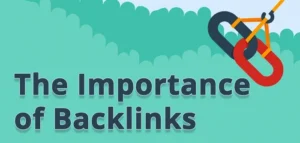
Backlinks are crucial for SEO for several reasons:
- Improved Search Engine Rankings Google and other search engines use backlinks as one of the primary ranking factors. Backlinks act as signals that a webpage is credible and authoritative, which directly impacts search engine rankings. If a page has several high-quality backlinks from reputable sites, it is more likely to appear higher in the SERPs.
- Increased Organic Traffic Backlinks can directly lead to more traffic. When a reputable website links to your content, it sends visitors from that site to yours. If the link is placed strategically and within a relevant context, it can generate significant referral traffic, boosting your site's visibility and user engagement. Of course, more importantly, increased rankings in search engines directly translate into increased traffic too, since the vast majority of people browsing search engine results pages only click onto one of the first few results.
- Faster Indexing by Search Engines When search engines crawl websites to index content, backlinks can play a vital role in helping new pages get discovered more quickly. If a new page is linked to from an already well-established page, search engine crawlers are more likely to find it and index it sooner.
- Building Trust and Credibility Backlinks from authoritative sources serve as a form of endorsement. They are like a stamp of approval from other reputable websites, signalling to both users and search engines that your content is valuable and trustworthy. This credibility can result in more backlinks and higher rankings, creating a positive feedback loop.
- Improved Domain Authority (DA) Domain Authority (DA) is a metric used to predict a website's ability to rank on search engines. Backlinks contribute directly to increasing a site’s DA, especially those from high-authority websites. A higher DA will improve the likelihood of ranking for competitive keywords and topics.
How Do Backlinks Influence Search Engine Rankings?
Search engines use backlinks as a major ranking factor for several reasons. Understanding how backlinks affect rankings requires a closer look at how search engines evaluate links:
- Link Quality Over Quantity It’s not just about the number of backlinks a page has; it’s about the quality of those links. Search engines prioritise backlinks from authoritative, trustworthy, and relevant sources. A single backlink from a high-quality site (such as a well-known news outlet, government website, or industry leader) can be more valuable than hundreds of low-quality links from irrelevant or spammy sources.
- Anchor Text Relevance Anchor text is the clickable text within a hyperlink. Search engines use anchor text as a signal to understand what the linked page is about. Optimising anchor text for relevant keywords can enhance the SEO value of a backlink. However, over-optimisation or keyword stuffing can lead to penalties.
- Follow vs. Nofollow Links Not all backlinks are created equal. A “follow” backlink is one that passes link equity (or “link juice”) to the linked page, helping improve its rankings. On the other hand, a “nofollow” link has a rel="nofollow" attribute, which tells search engines not to pass any link equity. While nofollow links don’t directly affect rankings, they can still bring traffic and contribute to a natural link profile.
- Link Context and Relevance Backlinks are more valuable when they come from content that is relevant to the target page. For example, a backlink from a reputable health website linking to an article on fitness will have more SEO value than a link from an unrelated industry, like technology. Relevance signals to search engines that the content being linked to is important for users searching for specific topics.
- Link Diversity Having backlinks from a variety of sources – such as blogs, news sites, forums, and social media platforms – helps to create a natural link profile. Search engines tend to favor websites with diverse link profiles, as this suggests that the content is being shared and referenced across different parts of the web.
The Role of Backlinks in Google’s Algorithm
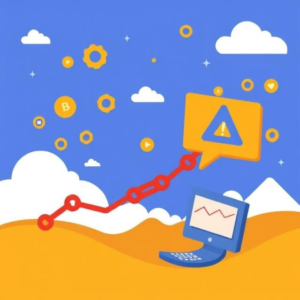
Google’s algorithm uses backlinks to determine the relevance and authority of a webpage. While it is just one ranking factor among many, backlinks are one of the most influential signals. The Google PageRank algorithm, which was initially introduced in 1998, famously used backlinks as a way to measure a webpage’s importance based on how many other pages linked to it. Although PageRank has evolved and is no longer used in its original form, backlinks continue to play a significant role in modern SEO.
Additionally, Google evaluates several factors surrounding backlinks, including the quality of the linking site, the relevance of the linked content, and the overall naturalness of the link profile. Websites with high-quality, natural backlinks are more likely to rank higher on Google compared to those with spammy or unnatural link-building practices.
How to Build High-Quality Backlinks
Acquiring backlinks, especially high-quality ones, can be challenging. However, with the right strategies, you can build a strong backlink profile that will benefit your SEO efforts. Here are some methods for acquiring quality backlinks:
- Create High-Quality, Link-Worthy Content The first step in earning backlinks is to create valuable, high-quality content that other websites want to link to. This could include in-depth guides, data-driven studies, infographics, or unique insights that are relevant to your audience and industry. Content that answers questions, solves problems, or provides fresh perspectives is more likely to attract backlinks.
- Guest Blogging Guest blogging is a popular strategy for acquiring backlinks. By writing articles for reputable websites in your industry, you can earn backlinks to your own site. It’s important to target websites that have a good reputation and a relevant audience, as this will not only improve your backlink profile but also bring referral traffic.
- Broken Link Building Broken link building is a strategy where you find broken or dead links on authoritative websites and offer your content as a replacement. This benefits the website owner by helping them fix broken links, while you get the chance to earn a valuable backlink.
- Outreach and Link Requests Building relationships with other website owners and influencers in your industry can open the door for backlink opportunities. Reaching out to websites with relevant content and asking for backlinks can be effective if done respectfully. Make sure to personalise your outreach messages and provide clear value in your request.
- Leveraging Social Media Social media platforms can help spread your content, leading to organic backlinks. When you share your content across social media channels, you increase the chances of others discovering it and linking back to it.
- Utilising Content Directories and Listings Submitting your website to reputable directories or industry-specific listings can provide backlinks that may boost your SEO efforts. However, avoid low-quality directories that might harm your site's reputation.
The Risks of Poor-Quality Backlinks
While backlinks are important for SEO, not all backlinks are beneficial. Low-quality or spammy backlinks can negatively impact your rankings. Some risks associated with poor-quality backlinks include:
- Penalties from Google Google has strict guidelines about backlink practices. If you acquire backlinks through black-hat SEO techniques, such as buying links or using link farms, your site could face penalties or even be removed from search results altogether.
- Toxic Link Profiles A website with a large number of low-quality, irrelevant, or spammy backlinks will develop a toxic link profile. This can cause a drop in rankings or deindexation by search engines.
- Link Schemes Participating in link schemes, such as reciprocal linking or link exchanges, can result in penalties. It’s essential to focus on earning natural, editorial backlinks rather than engaging in manipulative link-building tactics.
The Evolution of Backlinks in SEO
Backlinks have been a part of SEO since the very beginning. Google’s PageRank algorithm, introduced in the late 1990s, revolutionised the way search engines ranked websites. At its core, PageRank was based on the idea that links between websites were like votes of confidence — the more votes (backlinks) a page received, the more important it was in the eyes of Google.
However, over the years, the role of backlinks in SEO has evolved significantly. In the early days of SEO, it was common for websites to focus solely on accumulating as many backlinks as possible, without paying much attention to the quality of those links. This led to a range of black-hat SEO tactics such as link farms, paid links, and excessive link exchanges.
In response, Google began refining its algorithm to recognise the difference between quality and quantity. The introduction of Google Penguin in 2012 marked a major turning point in the way backlinks were evaluated. Penguin penalised websites that used manipulative link-building practices, such as acquiring low-quality or spammy backlinks, and placed greater emphasis on high-quality, natural links. As a result, the focus of modern SEO has shifted toward earning backlinks through valuable content and ethical outreach strategies.
Today, backlinks remain a crucial ranking factor, but the algorithms have become far more sophisticated. Google now assesses backlinks based on a variety of factors, including relevance, authority, and trustworthiness. As SEO continues to evolve, backlinks will remain a cornerstone of any successful SEO strategy, but only when acquired through proper, white-hat techniques.
How Backlinks Impact Different Aspects of SEO
While backlinks are universally important for SEO, their impact can vary depending on the type of website and the SEO goals. Let’s break down how backlinks affect different types of SEO:
1. Local SEO

For local SEO, backlinks from local sources are particularly valuable. Local backlinks signal to search engines that your website is relevant to a particular geographic area. This is important for businesses that serve specific locations, such as restaurants, law firms, or healthcare providers.
For example, a backlink from a local newspaper or business association’s website can significantly boost your local rankings in Google. Additionally, getting listed in local directories like Yelp, Google My Business, and local Chamber of Commerce sites can improve local SEO performance.
Local backlinks not only help with rankings but can also drive targeted, relevant traffic to your site. When a local consumer clicks on a link to your website from a local business blog or directory, they are more likely to convert, resulting in higher engagement and ultimately higher ROI for your business.
2. E-commerce SEO
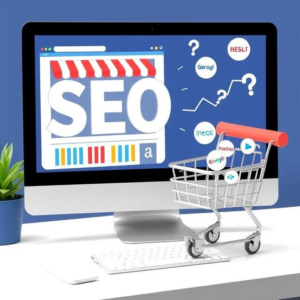
In the case of e-commerce websites, backlinks can contribute significantly to overall visibility, especially when ranking for competitive product categories. Backlinks help e-commerce sites rank not just for branded terms, but also for broad product keywords, such as "best running shoes" or "eco-friendly kitchenware."
For e-commerce websites, it’s also important to acquire backlinks to category and product pages. For example, a backlink from a reputable fashion blogger to a product page or a product roundup can increase both search visibility and referral traffic. Additionally, backlinks from relevant product reviews, news articles, or influencer partnerships are an effective way to boost e-commerce SEO.
3. Content Marketing

Backlinks are one of the main drivers of content marketing success. When your content is shared and linked to by others, it gains more authority and reaches a broader audience. Creating shareable, valuable content (such as guides, research, and infographics) that naturally attracts backlinks is an effective content marketing strategy.
The more quality backlinks your content receives, the more likely it is to rank well for target keywords. Additionally, each backlink is an opportunity for direct referral traffic from the referring site. This is particularly useful when you can build relationships with influencers and thought leaders in your niche to promote your content.
4. Blog and News Websites
For blog and news websites, backlinks are integral to content discoverability and ranking. When a popular website or news outlet links to a blog post, it increases the post’s chances of ranking higher in Google. News websites often benefit from backlinks to time-sensitive content, such as breaking news or trend articles.
Similarly, niche blogs that are linked to by other well-established blogs or forums benefit from an expanded audience and higher credibility. Backlinks in this case not only boost rankings but also contribute to long-term traffic growth by establishing the site as a trusted source within a particular field.
Best Tools for Backlink Analysis
A vital part of managing your backlink strategy is analysing the backlinks you have and discovering new opportunities. Here are some of the best tools for backlink analysis:
1. Ahrefs
Ahrefs is one of the most powerful tools for backlink analysis. It provides detailed insights into your backlink profile, including the number of backlinks, referring domains, anchor text, and more. You can also use Ahrefs to track the backlinks of your competitors, identify broken links, and find new opportunities for link-building.
2. SEMrush
SEMrush is another excellent tool for backlink analysis. It helps you monitor your backlinks, evaluate their quality, and track your competitors’ backlink profiles. With SEMrush, you can also explore link-building opportunities and analyse how backlinks are affecting your rankings.
3. Moz Link Explorer
Moz’s Link Explorer is a user-friendly tool that provides in-depth backlink data, including metrics like Domain Authority (DA) and Page Authority (PA). Moz is known for its link-building guides and offers various reports to help users understand their link profile and plan their SEO strategies effectively.
4. Majestic SEO
Majestic SEO is a specialised backlink analysis tool that provides a comprehensive view of backlinks. It has two main metrics: Trust Flow and Citation Flow, which measure the quality and quantity of backlinks, respectively. Majestic is great for analysing backlinks at scale and finding high-authority link-building opportunities.
5. Google Search Console
Google Search Console (GSC) is a free tool that provides valuable data about the backlinks pointing to your website. While it doesn’t offer as many in-depth features as the premium tools above, GSC is a great starting point for understanding your backlink profile and identifying potential issues.
Common Backlinking Mistakes to Avoid
While backlinks are critical for SEO success, there are several common mistakes that can hurt your website’s rankings. Here are some to watch out for:
1. Over-Optimisation of Anchor Text
Anchor text is a key factor in how search engines interpret backlinks. However, over-optimisation of anchor text (i.e., using the same keyword-rich text repeatedly) can lead to penalties from Google. Instead, focus on using natural, varied anchor text that accurately describes the content being linked to.
2. Acquiring Low-Quality or Spammy Backlinks
Buying backlinks or participating in link farms is a dangerous practice that can lead to penalties from Google. It’s important to focus on earning backlinks naturally through high-quality content and outreach. If you acquire backlinks from irrelevant, low-authority, or spammy websites, you risk harming your SEO efforts.
3. Ignoring Link Diversity
Having a diverse backlink profile is crucial for SEO. Relying too heavily on backlinks from a single source or domain type can appear unnatural to search engines. Aim for a balanced mix of backlinks from various sources, such as blogs, news sites, forums, and directories, to build a natural profile.
4. Focusing Too Much on Quantity Over Quality
While acquiring a large number of backlinks might seem appealing, quality is far more important than quantity. A few high-quality backlinks from authoritative sources are far more beneficial than hundreds of low-quality links. Focus on building relationships and earning backlinks that offer real value.
Backlinks remain one of the most influential factors in SEO. They are essential for increasing your site’s authority, improving rankings, and driving referral traffic. However, the process of acquiring backlinks should be approached with care and focus on quality over quantity. By consistently creating valuable content, building relationships, and avoiding black-hat practices, you can develop a strong backlink profile that will help your website thrive in the long term.
If you would rather spend your time on running your day to day business, and allow experienced backlink specialists to do this for you, consider getting in touch with omniSEO, the leading Cardiff SEO agency. We have carried out high quality backlink campaigns for hundreds of clients, from local shops to major national chains.
Consider getting a free SEO gameplan by filling in this form to request a free call about your site and the best next steps you can take.
How to Create a Topical Map for SEO
How to Create a Topical Map for SEO
In the world of SEO (Search Engine Optimisation), ranking high on search engines isn’t just about using the right keywords. It’s about creating content that satisfies user intent, provides real value, and is structured in a way that search engines understand. One of the most powerful ways to achieve this is by building a topical map.
A topical map, also known as a topic cluster model, helps you organise content in a logical and effective way that boosts your SEO strategy. By clustering related content around a central theme, you not only make your site easier to navigate, but you also signal to search engines that your content is authoritative on a particular subject.
Before we break down how to build one, let's go a bit further into why you should:
What is a Topical Map?
At its core, a topical map is a strategic way to organise content around a main topic and its subtopics. The main topic (often called a “pillar topic”) serves as the cornerstone content for a specific subject area, and the subtopics (referred to as “cluster content”) are detailed pieces of content that link back to the pillar page.
Here’s a breakdown of the basic components of a topical map:
- Pillar Page: A comprehensive, authoritative page that covers a broad topic in general terms.
- Cluster Pages: More specific, in-depth articles that address particular aspects or questions related to the pillar topic.
- Internal Linking: A well-structured linking system between the pillar and cluster pages, which helps Google understand the relationship between the content and increases the chances of ranking for related keywords.
The idea is simple: rather than publishing random articles on various topics, you create a clear structure that makes it easier for both users and search engines to navigate. When done right, this approach helps you rank for a wider variety of keywords, improves user experience, and strengthens your website's overall authority in a given niche.
Why You Should Use a Topical Map for SEO
There are several reasons why implementing a topical map can significantly improve your SEO efforts:
-
Improves Site Architecture and Navigation
With a topical map, you create a clear, logical structure for your content. When users can easily find what they’re looking for, they spend more time on your website, reducing bounce rates and increasing engagement. -
Strengthens Content Authority
A topical map helps you build authority around a subject. By clustering related content together, Google recognises that your site is a comprehensive resource for a specific topic, which can improve rankings for both the main keyword and its related terms. -
Boosts Organic Traffic
By targeting a variety of related keywords across your pillar and cluster pages, you’re increasing the chances of ranking for a range of search queries, ultimately boosting organic traffic. -
Enhances Internal Linking Strategy
Internal links are crucial for SEO. A topical map creates a natural and organised internal linking structure, which helps Google understand the relationship between different pages and improves overall crawlability. -
Improves User Experience
When your content is organised in a clear and logical way, visitors are more likely to stay on your website longer, explore other articles, and come back for more.
How to Create a Topical Map for SEO: A Step-by-Step Guide
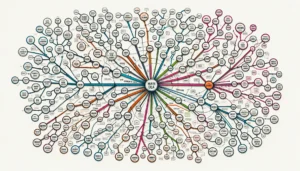
Now that you understand the benefits of creating a topical map, let’s dive into how to create one. Follow these steps to craft an effective topical map that enhances both your SEO and user experience.
1. Choose a Broad Pillar Topic
The first step is identifying a broad topic that you want your site to rank for. This should be a subject that is relevant to your audience and has a substantial search volume. Ideally, the topic should also be closely related to your business or brand.
For example, let’s say you run a website about fitness. A good pillar topic might be "Fitness and Health" or "Weight Loss." This topic should be broad enough to encompass many subtopics but specific enough to target a defined audience.
2. Research and Identify Subtopics
Once you’ve chosen your pillar topic, the next step is to identify the subtopics that will make up your content clusters. These subtopics should be related to the main pillar topic but focus on specific aspects, questions, or issues that your target audience is searching for.
You can use tools like Google Keyword Planner, SEMrush, Ahrefs, or AnswerThePublic to research subtopics. These tools will help you find long-tail keywords and questions that are commonly searched by users in relation to your pillar topic.
For example, using the “Fitness and Health” pillar topic, you might discover subtopics such as:
- "Healthy Eating for Weight Loss"
- "How to Create a Workout Plan"
- "Best Cardio Exercises for Beginners"
- "Yoga for Stress Relief"
These are all potential cluster topics that can be used to create more detailed, targeted content.
3. Create High-Quality Content for Cluster Pages
For each subtopic, create high-quality, in-depth content that answers specific questions or provides valuable insights. The goal is to make these cluster pages comprehensive enough to serve as standalone resources, while still linking back to the pillar page for additional context.
For example, the "Healthy Eating for Weight Loss" page might include information on diet plans, healthy recipes, and tips for sustainable weight loss. It should cover the topic in detail, while also linking back to the pillar page on "Fitness and Health" to help users dive deeper into the broader subject.
4. Build Internal Links Between Pillar and Cluster Pages
The next critical step is internal linking. Every cluster page should link back to the pillar page, and vice versa. This creates a solid structure that helps search engines understand the relationship between your pages.
In our example, the "Healthy Eating for Weight Loss" page should include links to the pillar page ("Fitness and Health") and possibly other related cluster pages, such as "How to Create a Workout Plan."
You can also link from the pillar page to the cluster pages. This helps establish a hierarchy and strengthens the SEO value of both the pillar and cluster pages.
5. Optimise for SEO
As you create each page, make sure to optimise for SEO. This means:
- Using Target Keywords: Include your primary keywords in titles, headers, meta descriptions, and throughout the content.
- Writing Engaging Content: Keep your content relevant, informative, and engaging for your audience.
- Including Multimedia: Use images, videos, infographics, or other media to make your content more engaging and informative.
- Ensuring Mobile-Friendliness: Make sure your website is mobile-optimised since search engines prioritise mobile-friendly sites.
- Adding Meta Tags and Descriptions: Add relevant meta descriptions, alt texts for images, and structured data where appropriate to help search engines understand your content.
6. Track and Measure Results
After creating your topical map, it’s important to track its performance. Use Google Analytics, Google Search Console, or other SEO tools to monitor how your pillar and cluster pages are ranking. Look at metrics like:
- Organic traffic to each page
- Keyword rankings
- Bounce rates
- Average session duration
This data will help you identify which parts of your topical map are performing well and which need improvement.
7. Update and Expand Your Map
SEO is an ongoing process, so don’t stop after creating your topical map. Regularly update your content to keep it fresh and relevant. As new trends or questions emerge in your niche, consider adding new subtopics to your cluster pages or even creating new pillar pages.
Best Practices for Creating a Topical Map
- Focus on User Intent: When creating content for your pillar and cluster pages, make sure you’re addressing the questions and needs of your target audience.
- Use Clear and Simple Navigation: Organise your website so that visitors can easily navigate between the pillar and cluster pages.
- Prioritise Quality Over Quantity: Don’t create content for the sake of content. Each page should provide real value and answer specific questions.
- Be Consistent: Use a consistent structure for your pillar and cluster pages so users can easily understand how to find the information they need.
Creating a topical map for SEO is a strategic way to improve your website’s content structure, enhance user experience, and increase your chances of ranking high on search engines. By focusing on a pillar topic and surrounding it with well-researched cluster topics, you’ll create an organised, authoritative content strategy that benefits both your audience and your SEO goals.
Remember, building a successful topical map takes time, research, and consistent effort. But once implemented, it can be one of the most effective ways to boost your site’s visibility, attract more organic traffic, and become a trusted resource in your industry. Start building your topical map today and watch your SEO results soar!


